Part 14: Antes da Tempestade

Today, we discuss Portugal and warfare.
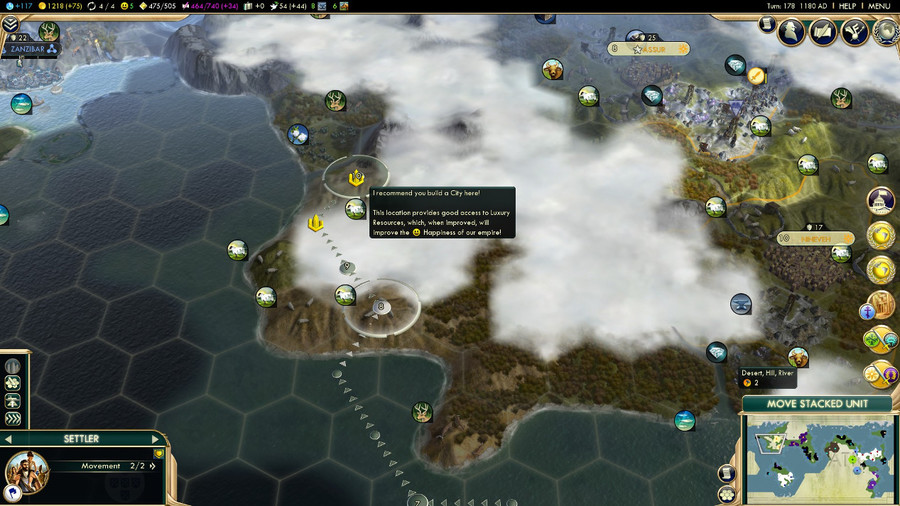
The Portuguese, as established previously, had manpower issues relating to maintaining a hold on their colonies, so it should come as no surprise that in times of war, Portugal had a hard time holding their own against opposing forces at their level of technology.
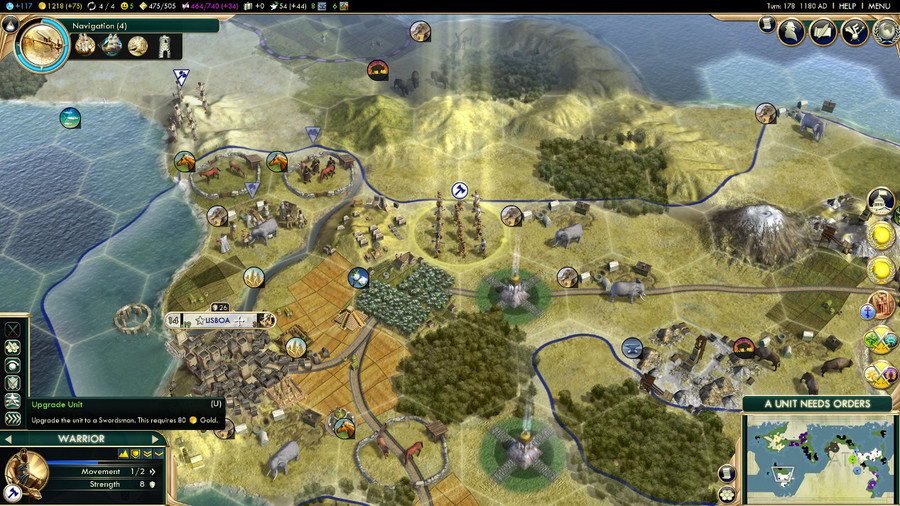
This circumstance meant that their most successful conflicts were ones in which they were acting as part of a collaborative force, such as during Crusades where their strict adherence to Catholic doctrine earned them staunch allies. Alternatively, they were successful when the opposing force lacked technological advancements, meaning that they were well-suited for colonial conquests.
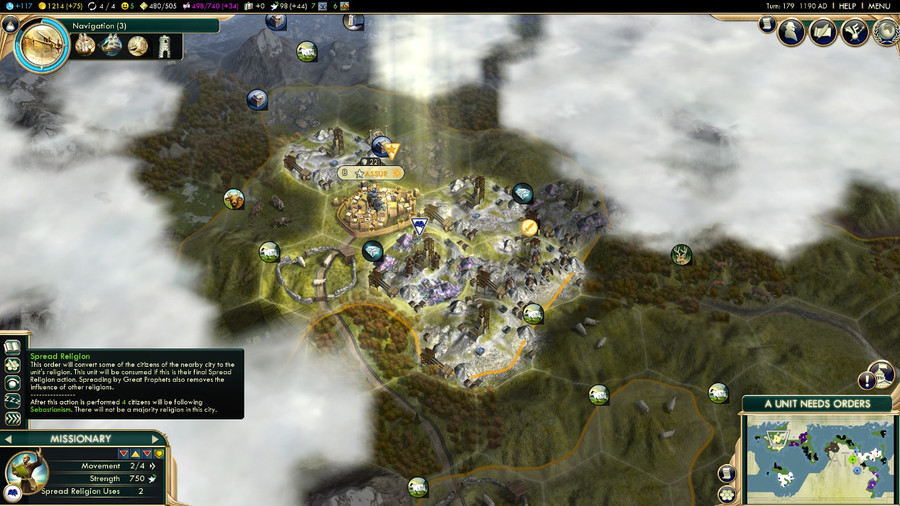
This doesn't paint a flattering picture of Portuguese military history, to be sure, but it presents an interesting lesson in the value of creating alliances and empire-building through more than sheer military means...
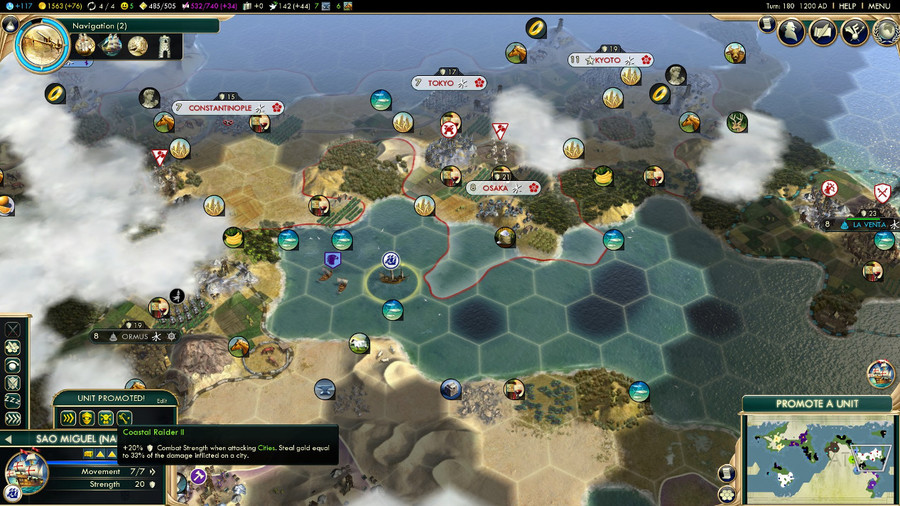
In the midst of the wars now engulfing the world, the Portuguese were conflicted as to the best ways to move forward.
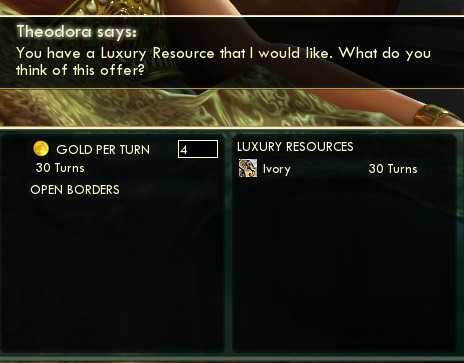
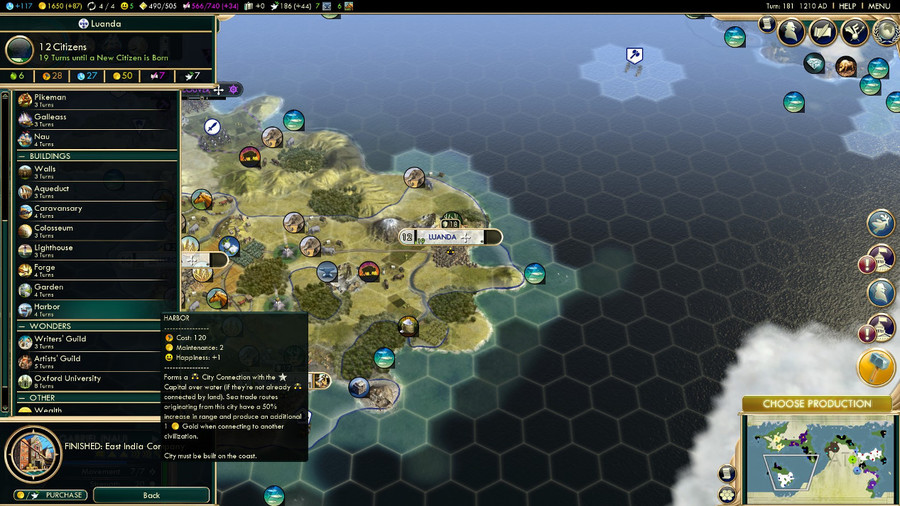
On the one hand, there were opportunities for commerce and trade still ongoing, and there was a strong need to support a newly-emergent city with a growing economy.
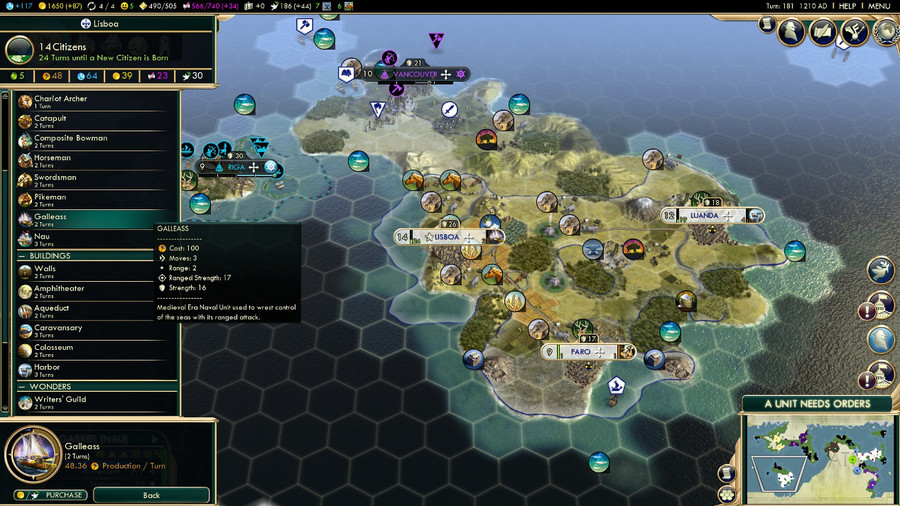
On the other, the Portuguese were making striking advancements in their naval prowess compared to their contemporaries around the world, and there was the sense that maintaining that lead would be necessary to avoid, or even end, the potential oncoming disaster.
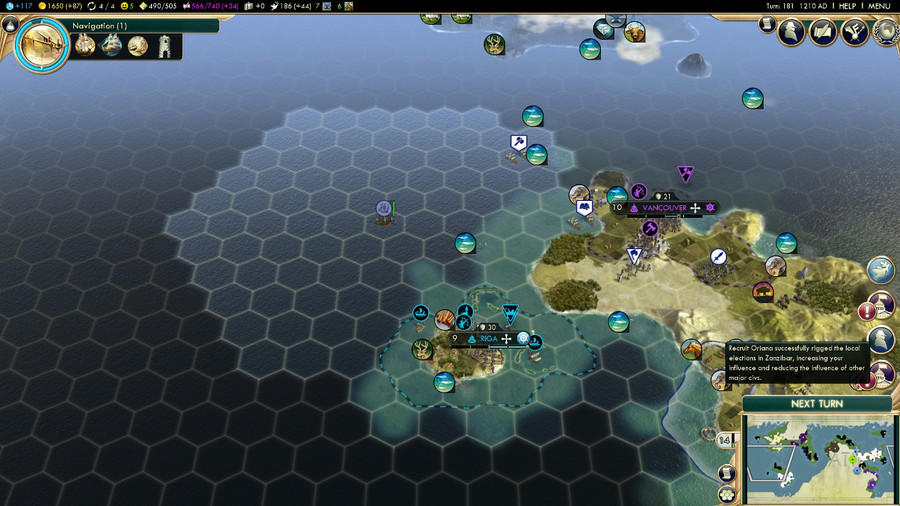
For her part, Senhora Oriana was becoming increasingly able and talented, and perhaps represented the sort of boldness necessary to survive in the emerging era.
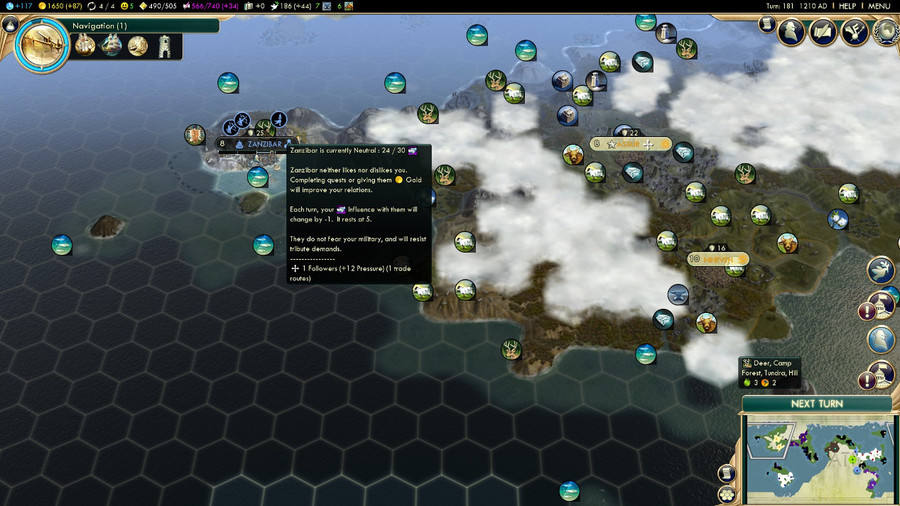
Her talents were already bearing fruit in distant lands.
The "Rigging Elections" action spies take in City-States causes an influence jump (25 points in this case) and it is possible for spies to lead "Coups" in City-States allied to other Civs which can break an Alliance at the cost of risking the Spy's own life.
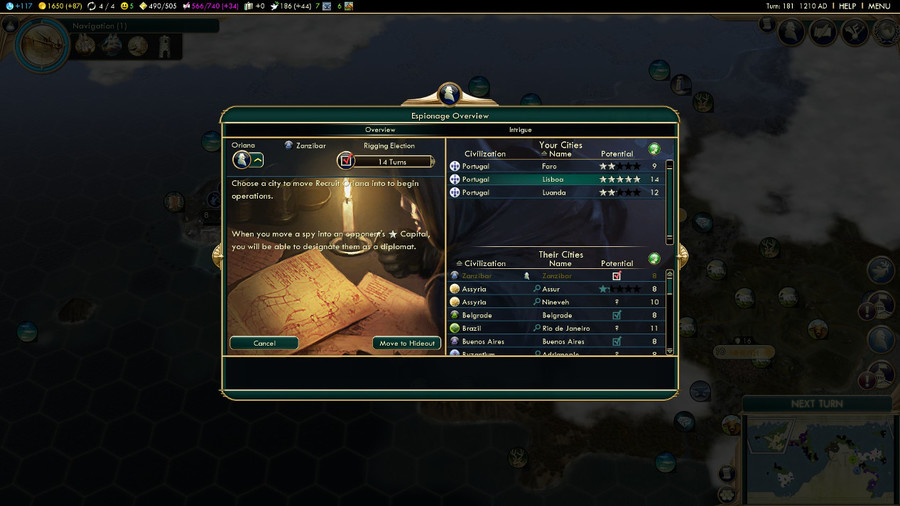
Oriana's real test, however, would be to see if she could undo the damage caused by other similar influences in her own home.
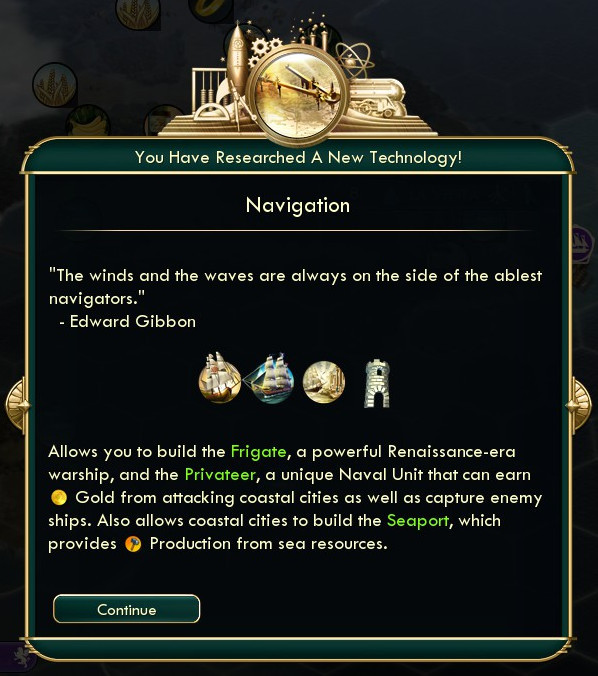
The people of the Universidades have mastered the seas like no others before them.
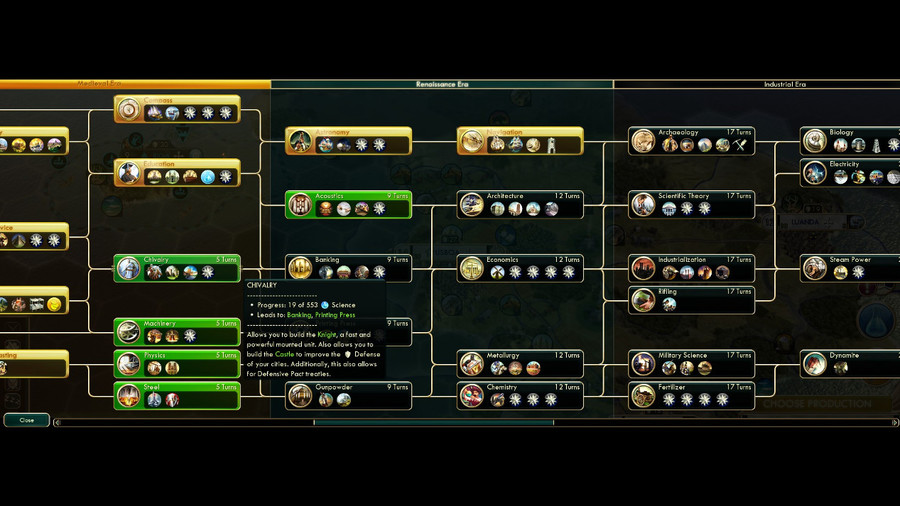
Yet, do they have what it takes to develop a true code of honourable warfare?
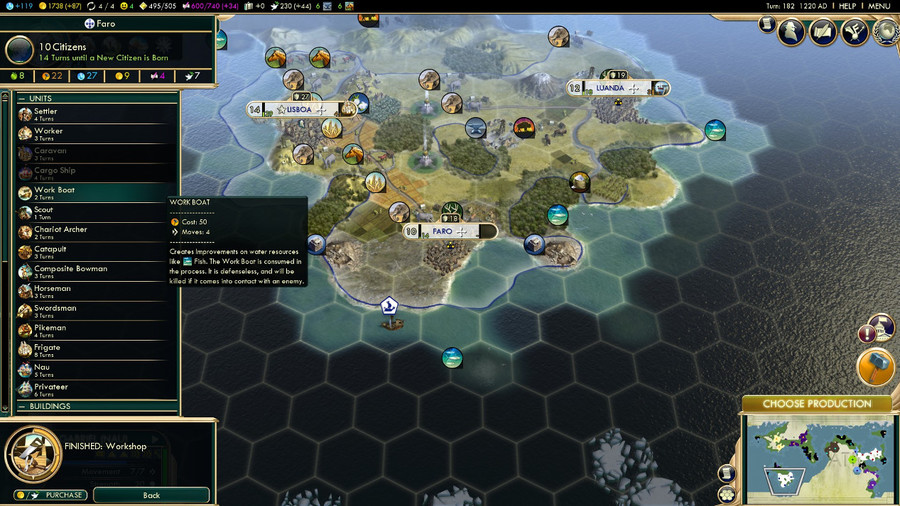
The industrious Faroans continue to make steps towards building their place at sea.
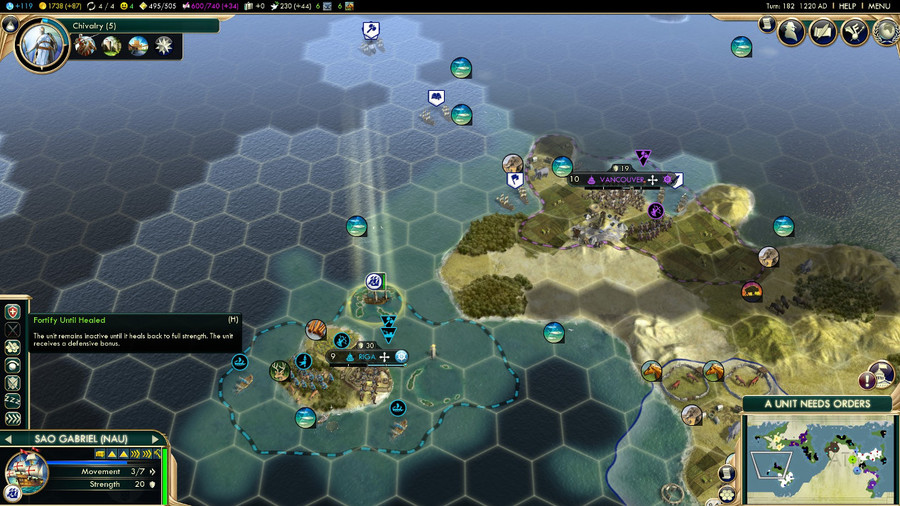
The São Gabriel repairs some light battle damage on allied shores.
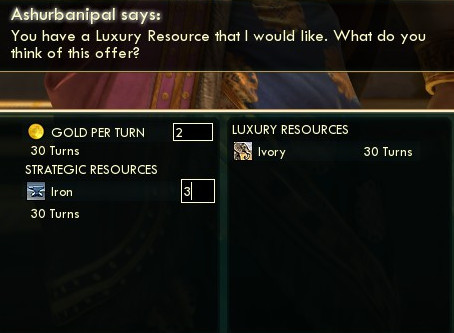
Ashurbanipal makes a questionable offer, but Dona Maria accepts it after a brief negotiation, claiming that the Iron will be necessary in the coming years.
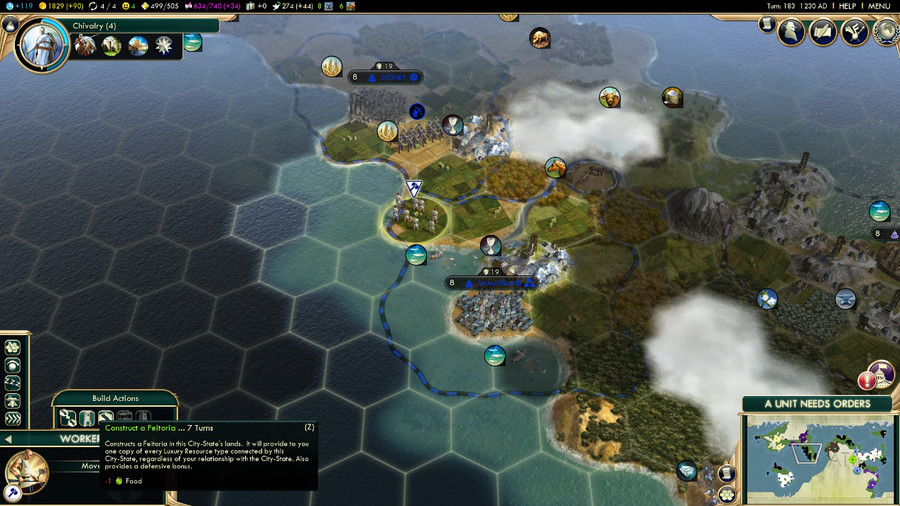
The Worker Corps of Luanda arrive in Samarkand, and begin their unusual task of building on foreign shores.
This is the Feitoria, the Portuguese Unique Improvement, and it is really good, if a little inconvenient to implement. It must be placed on the shores of a City-State, and once it is complete, Portugal will gain the Happiness Bonus associated with all Luxury Resources the City-State has, regardless of its political affiliation. Because Samarkand trades in Silver and the unique resource Porcelain, that means we will essentially get +8 Happiness at the cost of sending our Worker to parts unknown for a little while. A good trade if ever there was one.
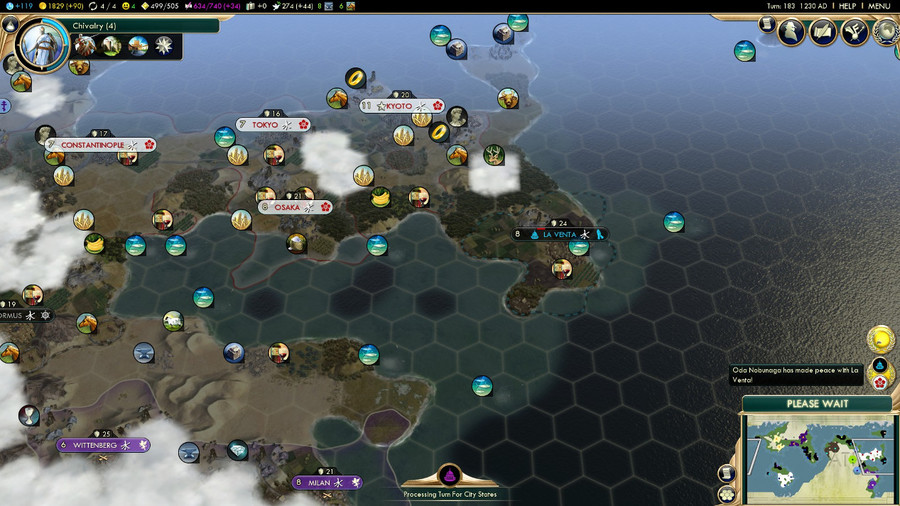
From abroad, there is word of some sort of miracle taking place in Japanese territory. Oda Nobunaga's and his fellow assorted ruffians have apparently given up on the siege of La Venta, despite all indicators that their efforts would have succeeded. Whether this was due to some sort of military mismanagement or divine providence granted to the people of La Venta due to their faith, Dona Maria can only idly speculate.
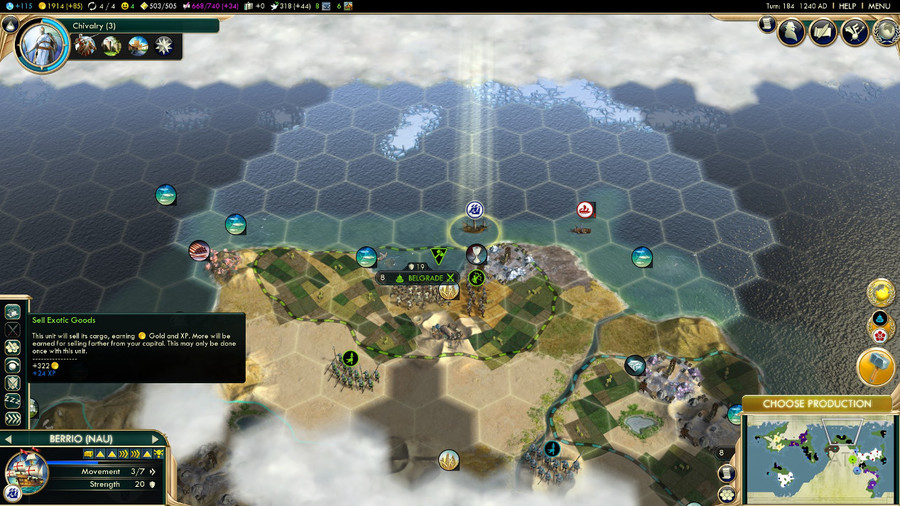
Instead, it is more important to focus on matters that the Portuguese know better, such as dealing in ivory goods. The men of the Berrio also have a hearty laugh at the state of the outdated Japanese craft, as it seems to be one stiff breeze away from sinking.
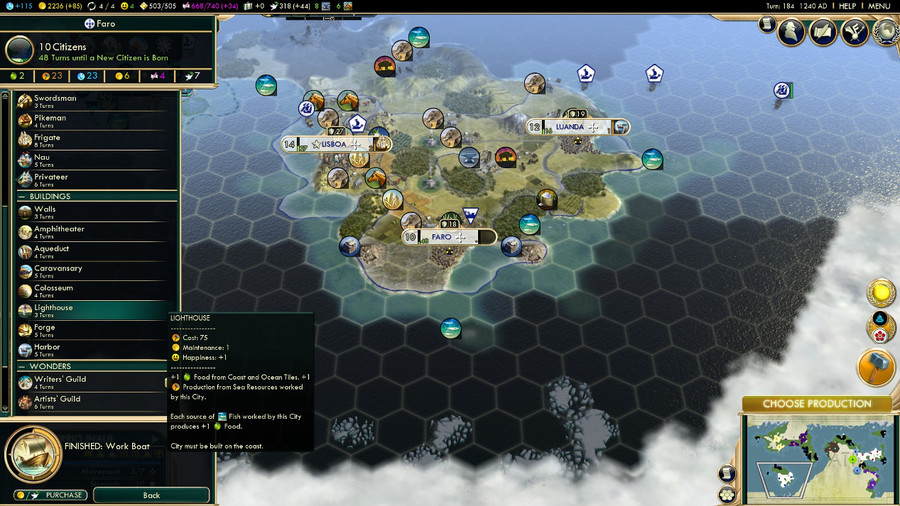
The people of Faro begin to assert their own dominion over nearby shores, and send a small fleet of fishing boats out to explore rumours of schools of cod at a nearby estuary.
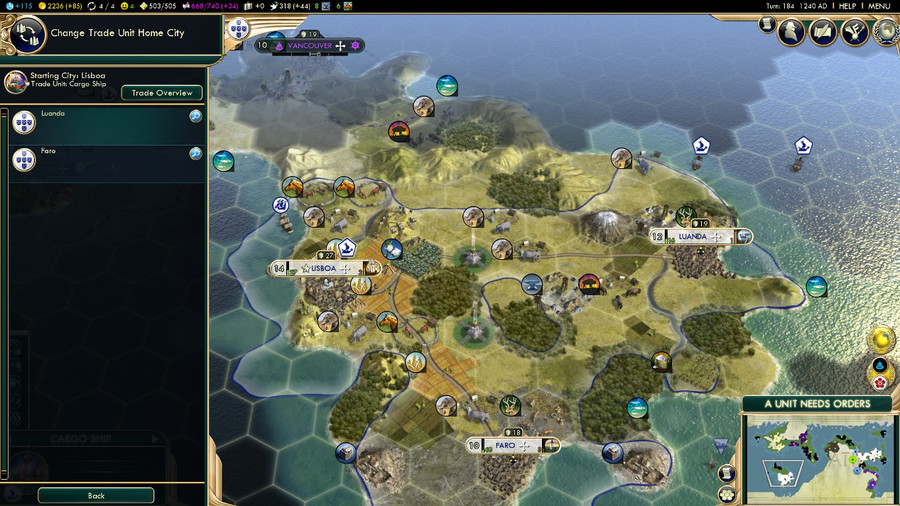
At this point, the proud Lisboans also recognize, with some consternation, that their cousins in Luanda are quickly becoming superior tradesmen, and a trading vessel is relinquished to the control of the Casa.
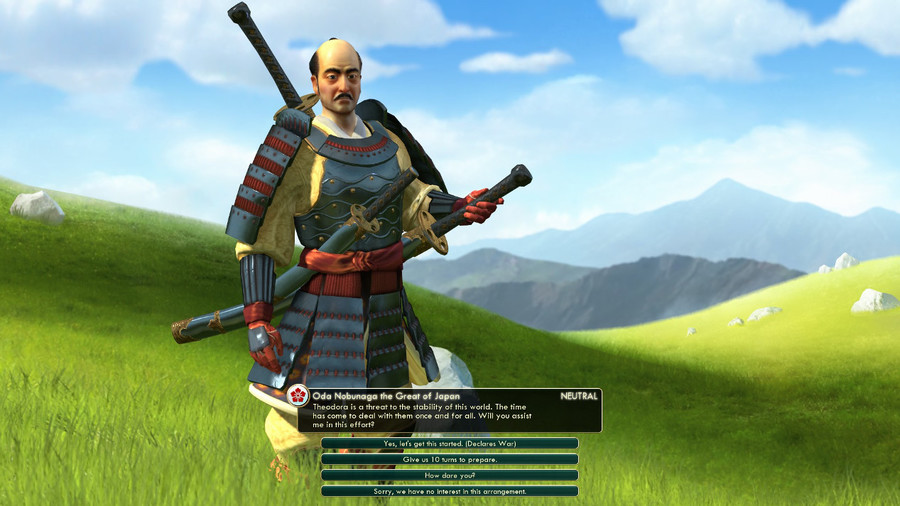
Oda dares to show himself before the Portuguese Queen with an outlandish request for support against the Byzantines. He is rebuked with as much venom as the shrieking monarch can muster, but simply brushes off her exhortations with a turn of his back.
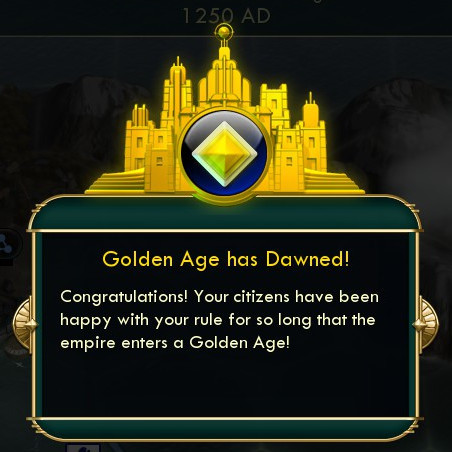
When she awakens, the angry Queen takes to the front steps of the Palace, and is stopped dead at the sight of a massive festival sweeping the streets, with wealthy Sebastianist scholars and hardy fishermen dancing in the streets. Her presence livens the festivities, and she does her best to regain some composure by leading the throngs of appreciative Portuguese on a hunt across the plains, showing her people how best to bring down elephant and bison alike with a single arrow.
We have our first Golden Age, since we have managed to go above the pithy 2-3 Happiness average we have been struggling with for the better part of the game.
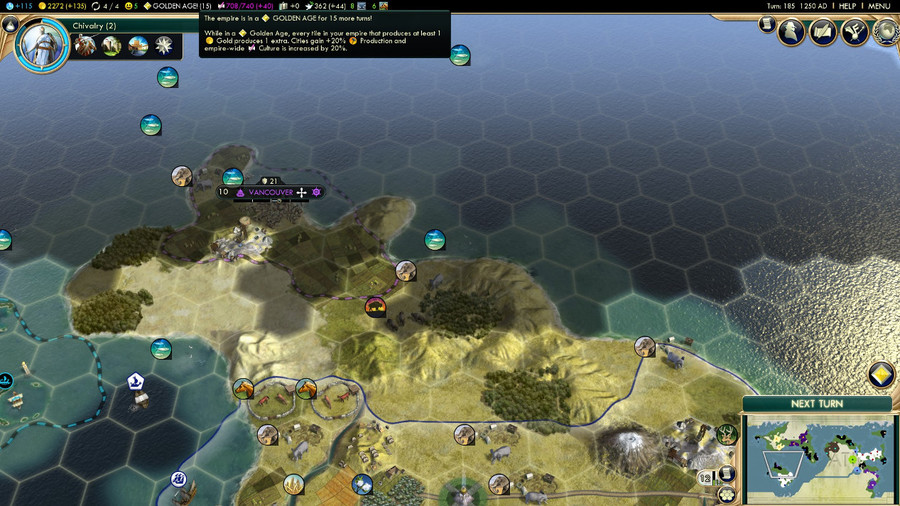
Here are its effects. The Culture boost would be nicer if we had a better Culture game overall, but the Production and Gold increases are especially nice given our overall wealth, and this will also help us ramp up towards a war. Also, remember that your everyday Golden Age only lasts 10 turns, but thanks to Chichen Itza we get a longer, better one.
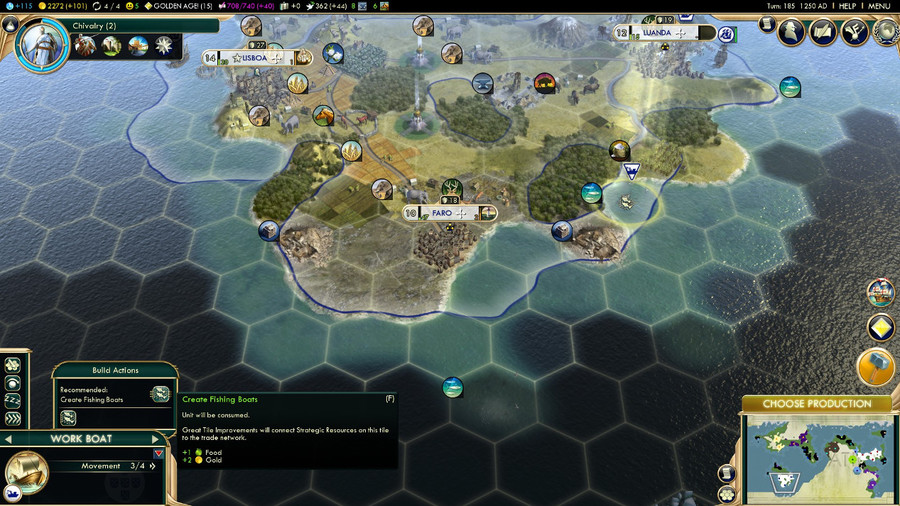
The people of Faro, however, seemingly know no holidays, and instead devote the time to fishing for cod off the southeastern shores, having petitioned Dona Maria to devote some of the Empire's treasury towards purchasing the nearby shores.
Fishing Boats are the Workers of the sea, but they are consumed upon completion of one Tile Improvement. The plus side is that they move faster than Workers and their Tile Improvements are completed instantly.
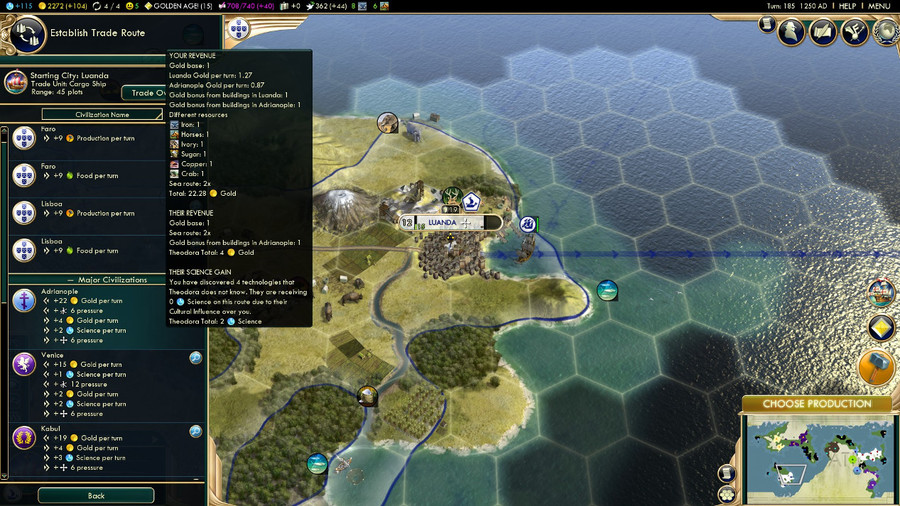
The Casa de Luanda decides that the time is right to trade with neighbours in Adrianople, since the very alien Byzantine culture can afford the trade of goods at great profit to the people of Luanda.
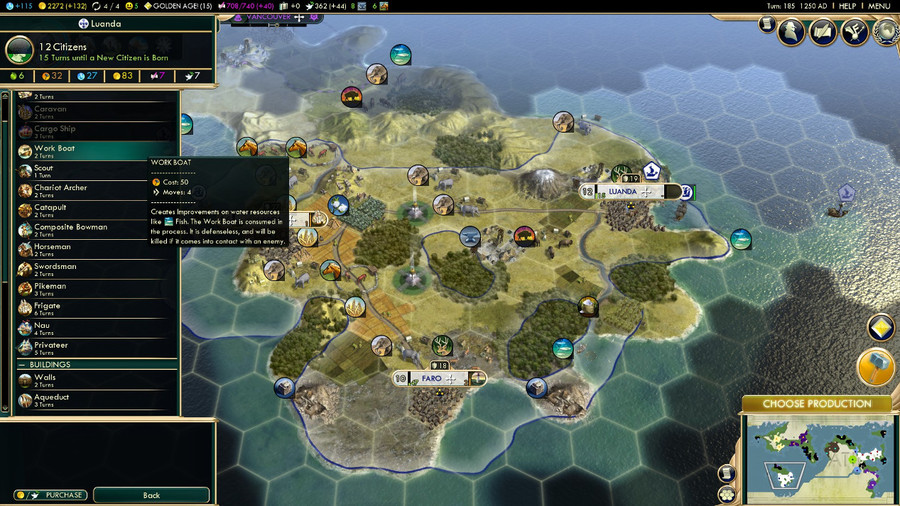
Though, the local government decides to follow the example of Faro of all places, and begins investigating rumours of salt cod near their own shorelines. They even begin drafting a proposal to Dona Maria to make a similar purchase of the coastal property in support of the discovery.
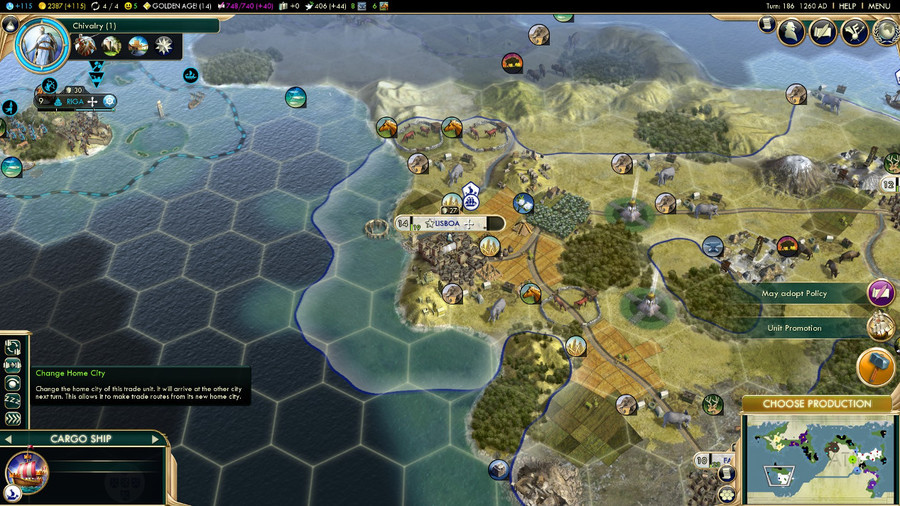
The first of the Frigate-class war vessels is completed in Arquimedes' shipyards, and it leaves the Lisboan port with apprehensive glances from the Sebastianist workers who helped create it. The vessel is loaded with terrifying firepower whose broadside cannons can unleash a volley of shots over impossibly long distances with a hellish roar.
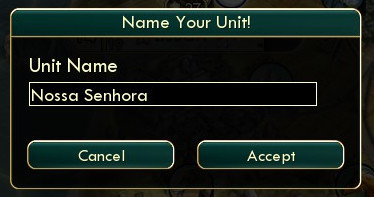
The sailors were reminded of their Queen, and named the ship accordingly.


They had undergone Bombardment training in order to develop better offensive potential against land-based fighters, since there was little risk of the Portuguese fleet fighting against an equal force at sea.
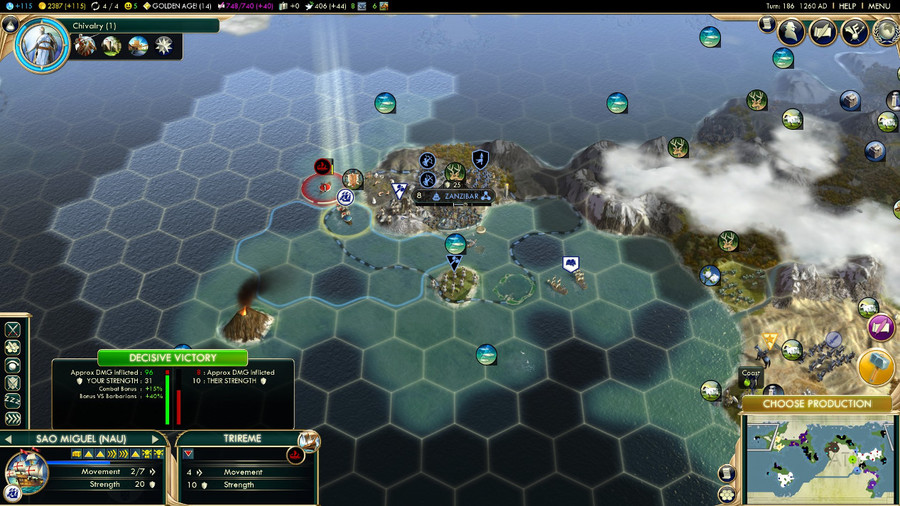
The São Miguel opted to prove just that with an opportune strike against Barbarians off the coast of Zanzibar.
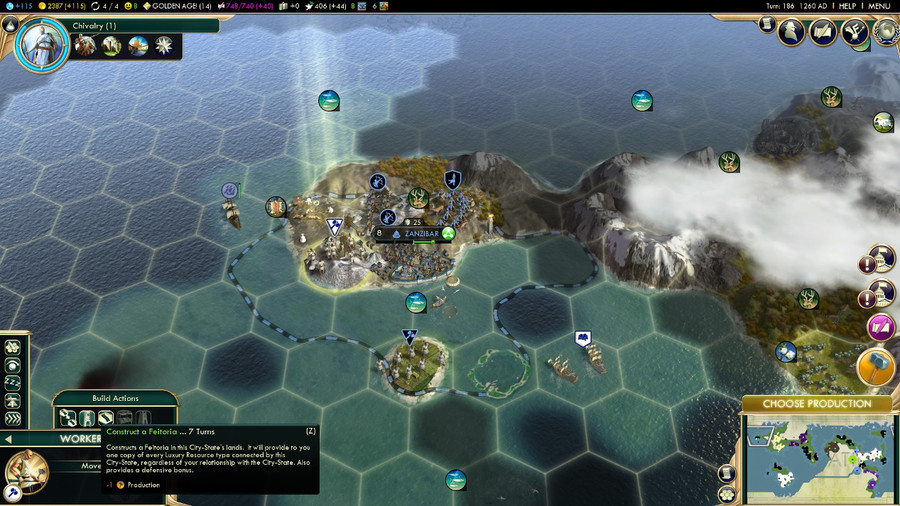
In their appreciation, the people of Zanzibar allowed the Nau free passage in their waters, while the Workers of Lisboa began work on the new Feitoria.
Of note, if the City State has a mission to eliminate an invading Barbarian force, then you should suffer no Influence penalty for leaving Military units within their borders as long as the mission is active. This way you don't automatically lose Influence gained for eliminating the Barbarians in the first place.
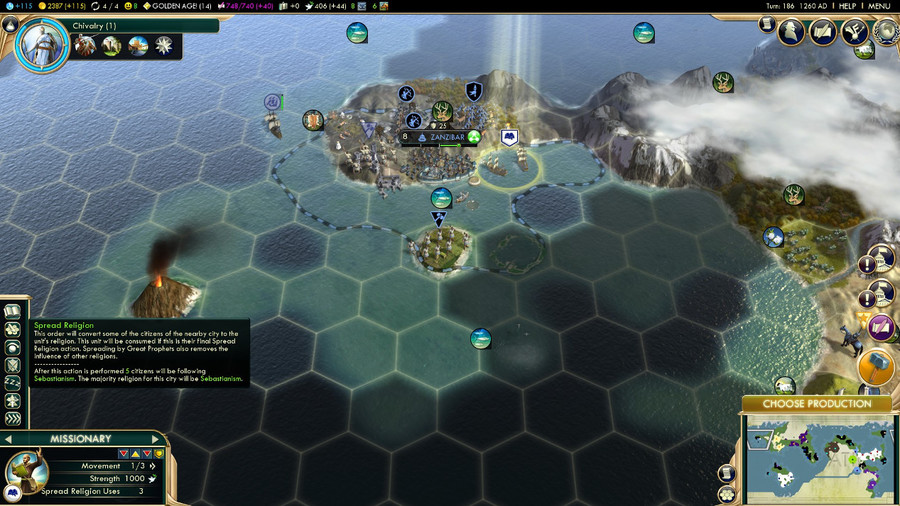
The Sebastianist scholars also begin to spread their teachings to Zanzibar, hoping that they will follow the example of the Assyrians in beginning to adopt the faith.
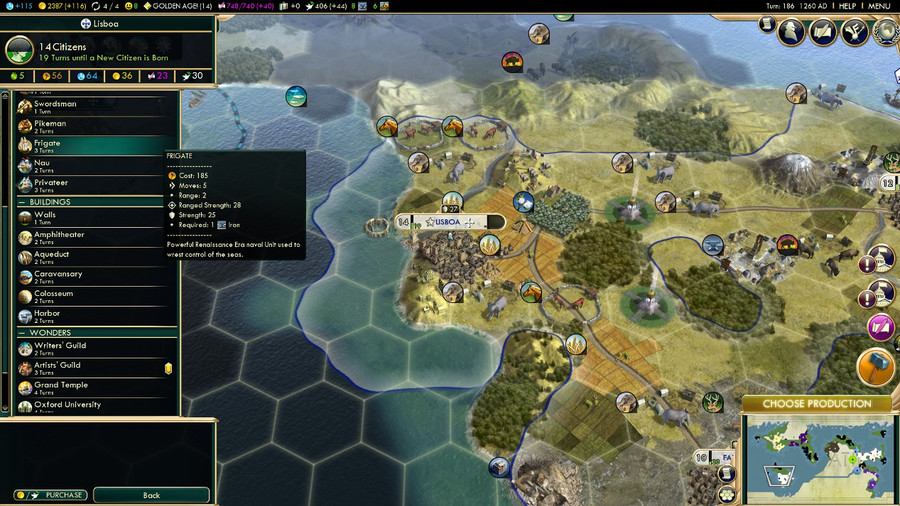
Lisboa continues with the development of Frigates, commissioning Nossa Senhora de Conceição, Nossa Senhora de Vale, and Misericórdia in turn.
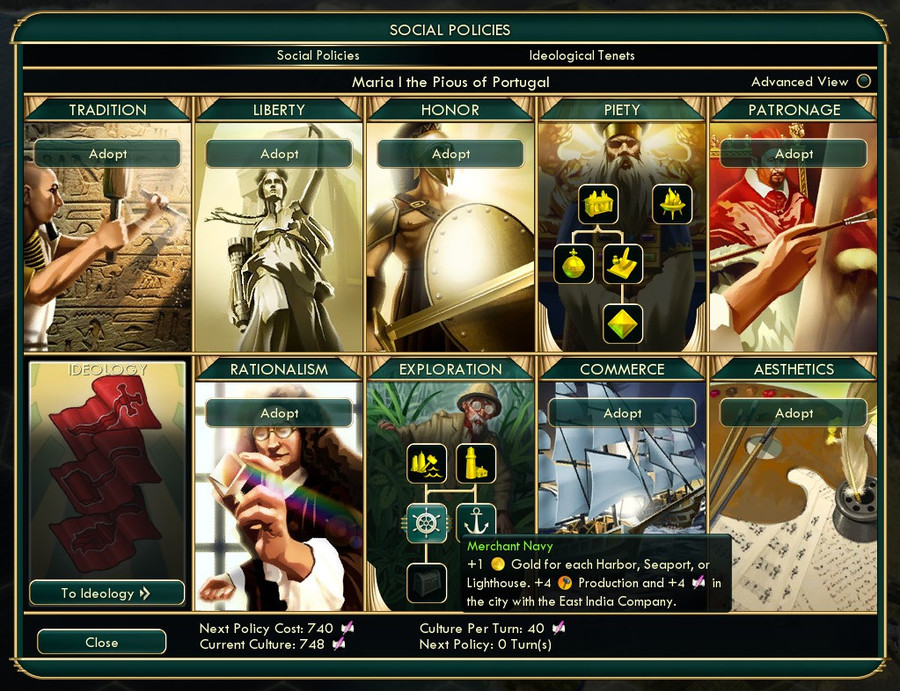
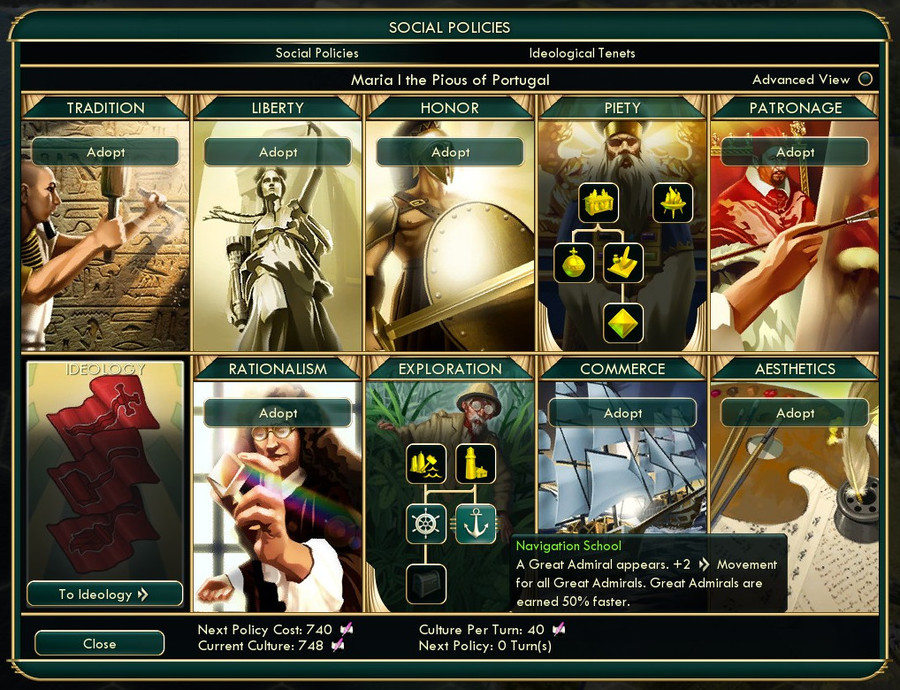
The sudden influx of demand for skilled sailors in times of battle necessitates the creation of the Escola Naval de Portugal, which trained men to become naval officers. Almost immediately, one such individual makes himself known as a genius tactician who rises among the ranks of the Admiralty.
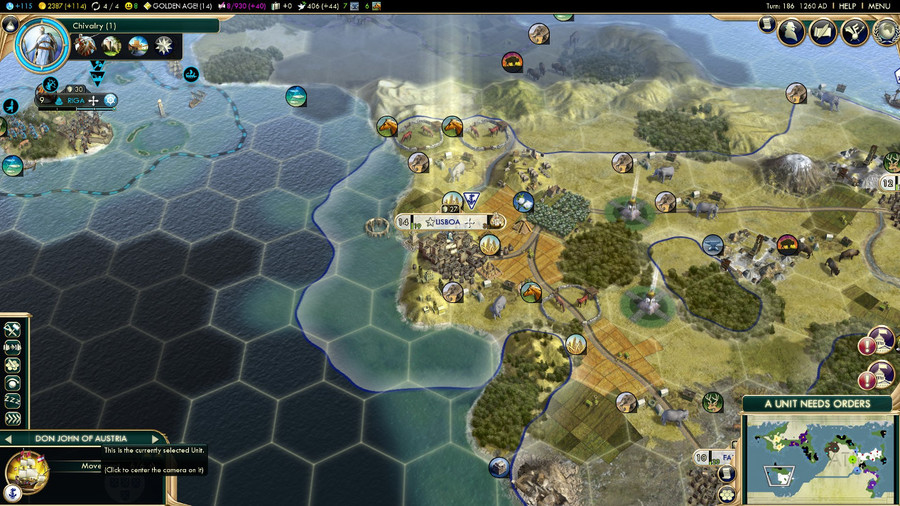
His name is João de Almeida, though he is "Dom João" to admirers and men under his command.
A handsome youth in his days at the Escola, his features and countenance were toughened by his fierce training and dedication to his fellows at sea. His prowess at hunting was supposedly the stuff of legend, as his family in ancient times was said to have descended from the Hunt Goddess, and his eyes were said to be able to see over greater distances than men with spyglasses.
An inspiration to the people of Portugal, he became known not only for his personal skill, but his compassion for his fellow human beings. He was said to have been inspired to act from stories he had heard of people being oppressed by Roman and Japanese conquerors, and that his place in the world was that of a liberator, someone able to correct great injustices in the world on behalf of his country.


Great Admirals, as you will soon see, are not classed as military units so they are vulnerable in combat. However, they instead provide a passive boost to combat ability to military vessels within two tiles, and can provide a one-time healing effect to all naval units in range at the cost of the unit itself. They are probably the least-seen Great Person in your average Civ game, but given our unique circumstances, I feel that he will be useful.
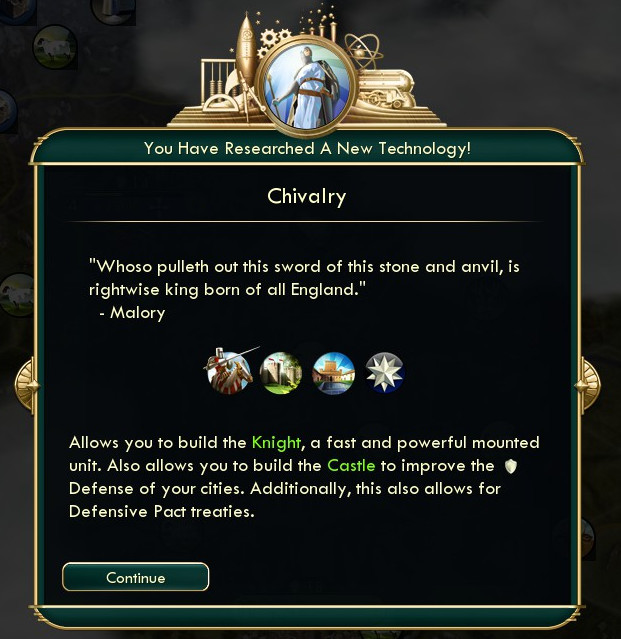
Dom João also believed that his position was ultimately one of honour, and his duty to his people was one to be celebrated and followed by others of similar talent.
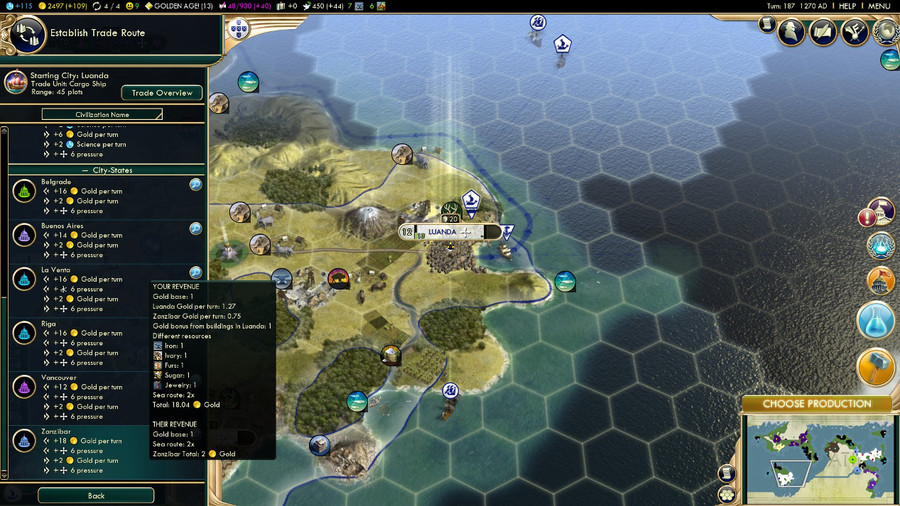
However, in Luanda, a man of similar talent begins to rise to prominence from amidst the ranks of the Casa.
His name is Antonio Salazar.
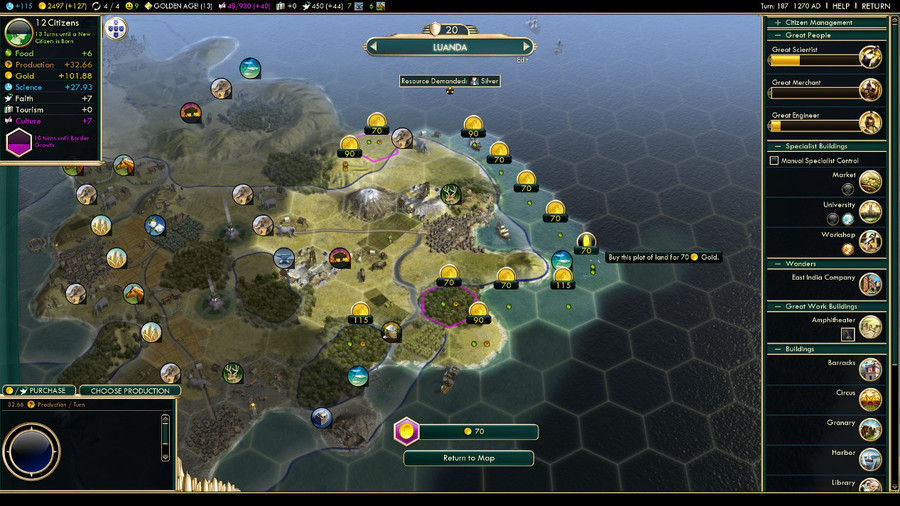
He first becomes known for his role in directing the routes of Luanda's trade vessels, and then for drafting the proposal for the Crown's acquisition of yet another plot of fish-rich ocean territory.
A devout Sebastianist, Senhor Salazar was apparently educated in the Universidade de Lisboa around the same time that Dom João was in the Escola, though Antonio's own talents shone on the realms of finance, philosophy, and Sebastianist doctrine. A fierce and critical thinker, Salazar was said to be able to sustain himself with complicated problems or issues, being able to forego the needs of food or sleep for several nights as he pondered complex equations or Sebastianist ethics.
It is in these times that the panicked messenger, racing through the reveler-packed streets of Lisboa, broke through the crowd and raced to Dona Maria's side, bearing ill news.

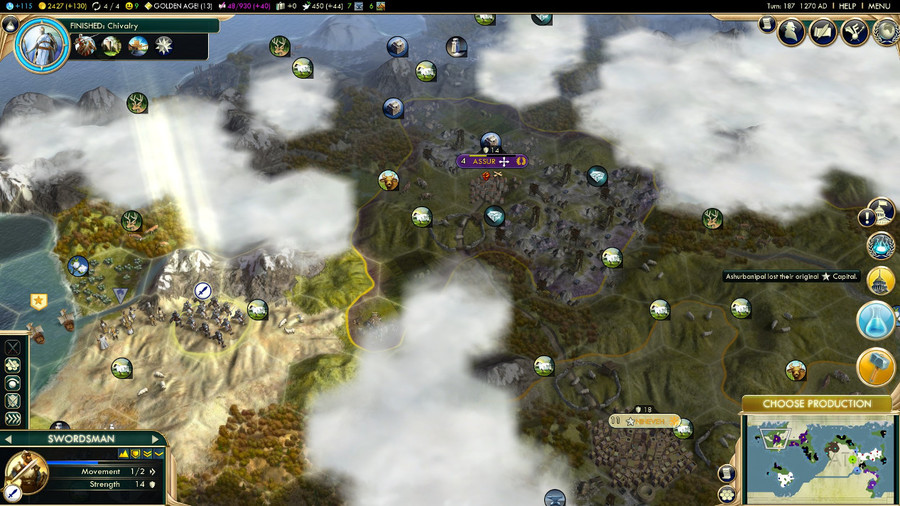
The crowds fell silent as the Queen stood very still, her face contorting briefly with despair, as though she could see her fellow Sebastianists in Assur suffering under the yoke of the Romans. After a long pause, she spoke.
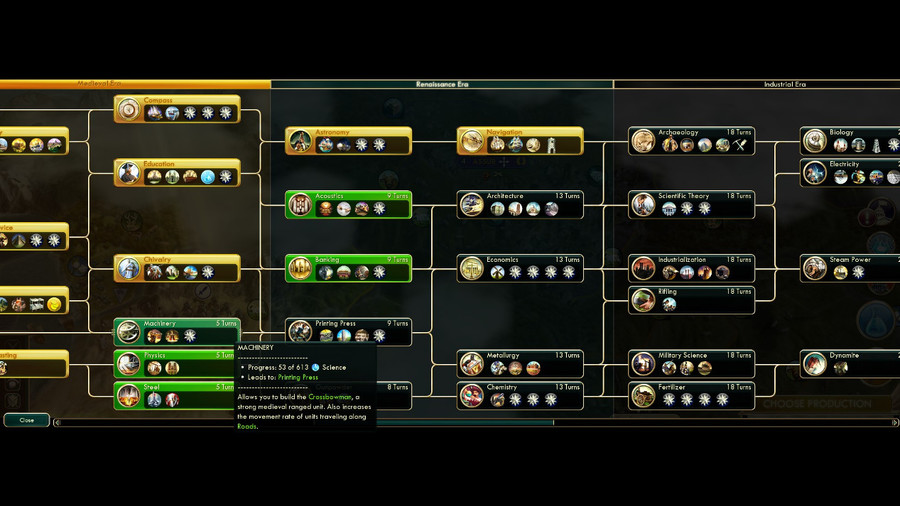
First, she commanded the Universidade to begin finding a means of providing new weapons for battle.
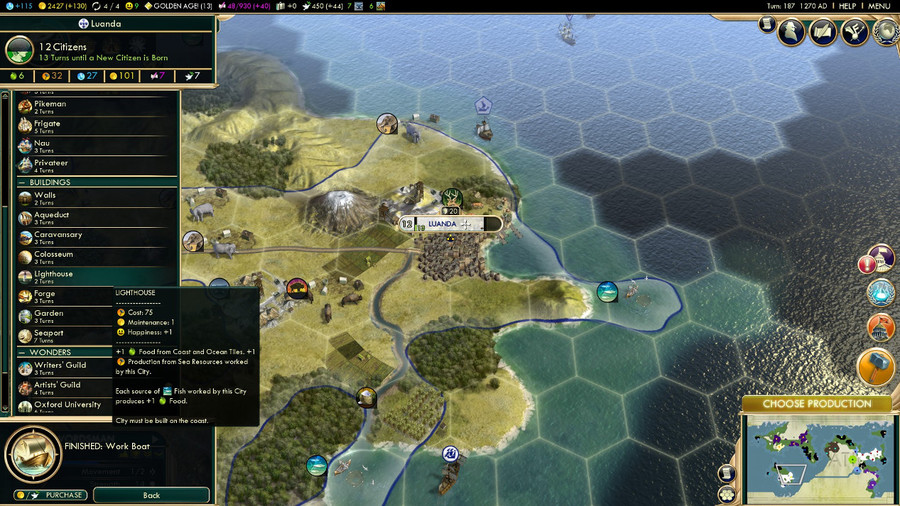
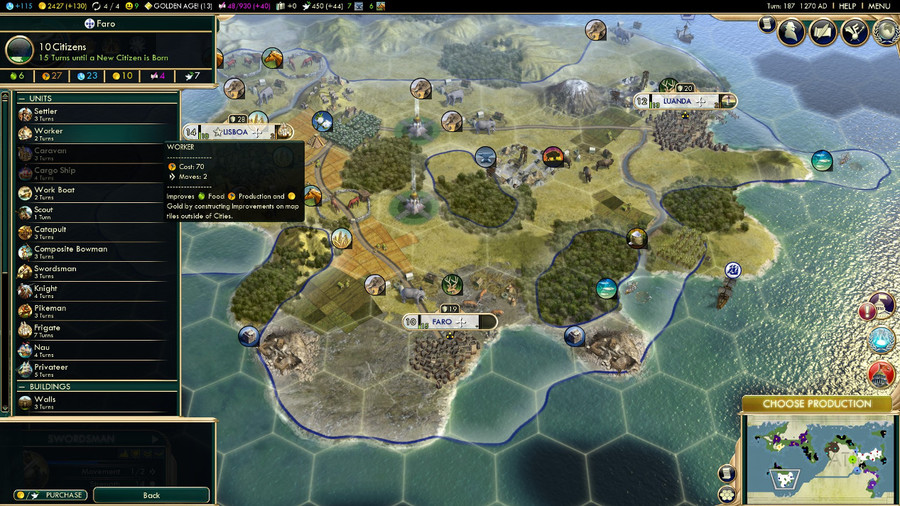
Then, she sent missives to Luanda and Faro to proceed with their own projects as normal, since Lisboa would be concerning themselves with naval development.
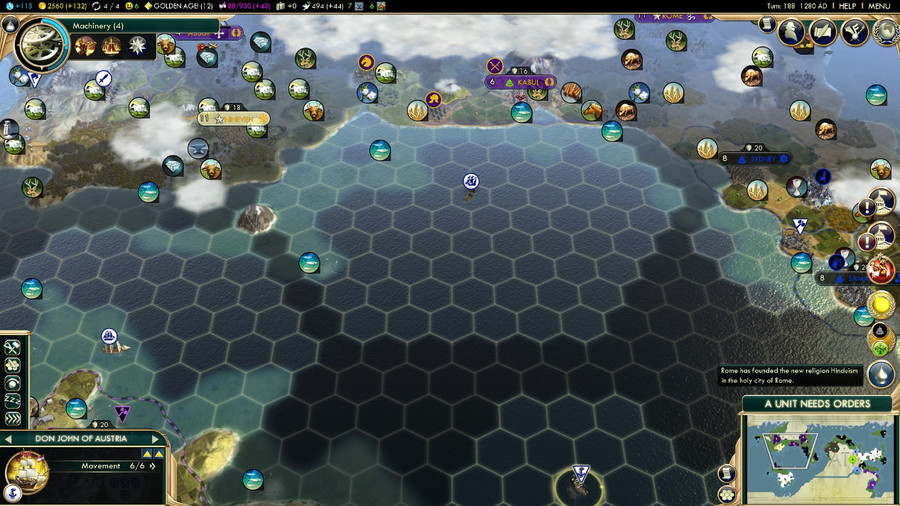
She heard through the grapevine that Rome had also begun to embrace some sort of heresy, and that was the last straw.
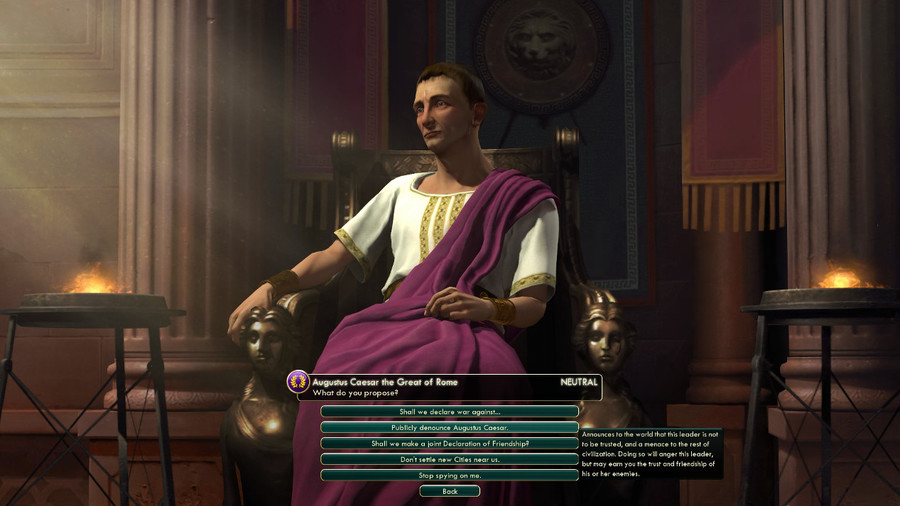
When next she slept, Dona Maria sought to personally deliver her choice of invective to the Roman personally.
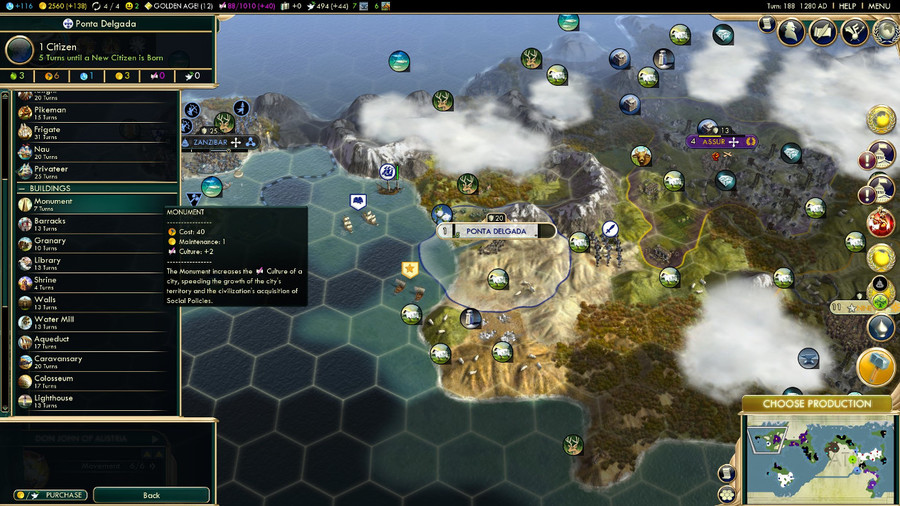
Thereafter, the city of Ponta Delgada was founded, blessed as it was by the presence of the comforting sight of cotton, a significant number of domesticable woolen beasts known as "sheep", and even a deposit of rock salt to the south.
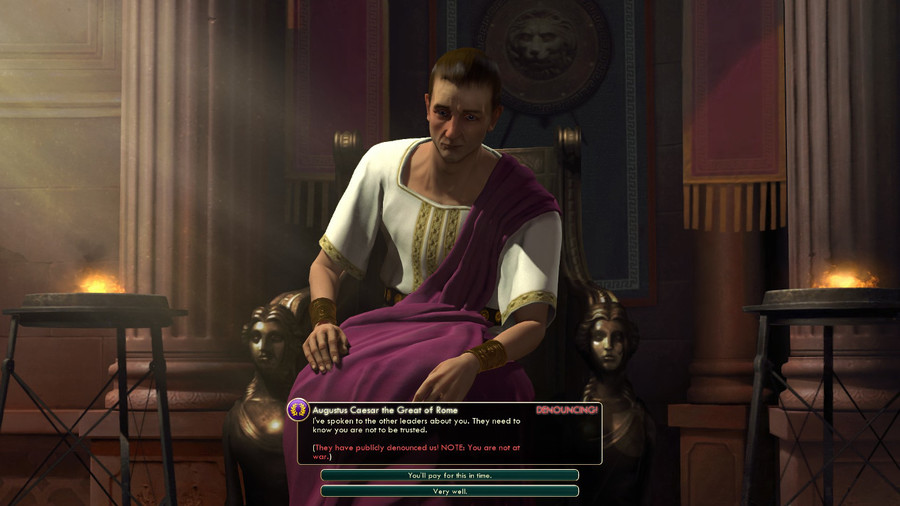
Having had time to consider Dona Maria's insult, the Roman decided to respond in kind, though his word likely meant little considering the atrocities for which he was responsible.
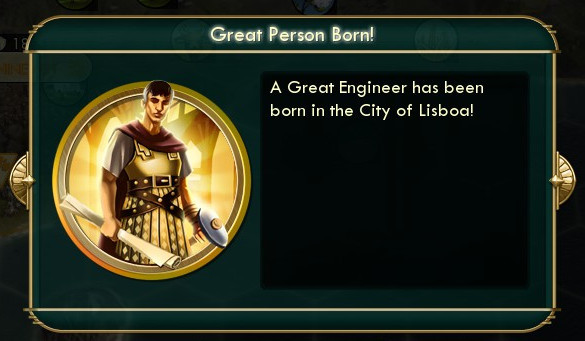
In times of conflict, great people would rise to the fore. However, this man did not seem inspired by the goings on of the era, and decided instead to bide his time until an inspiration came to him.
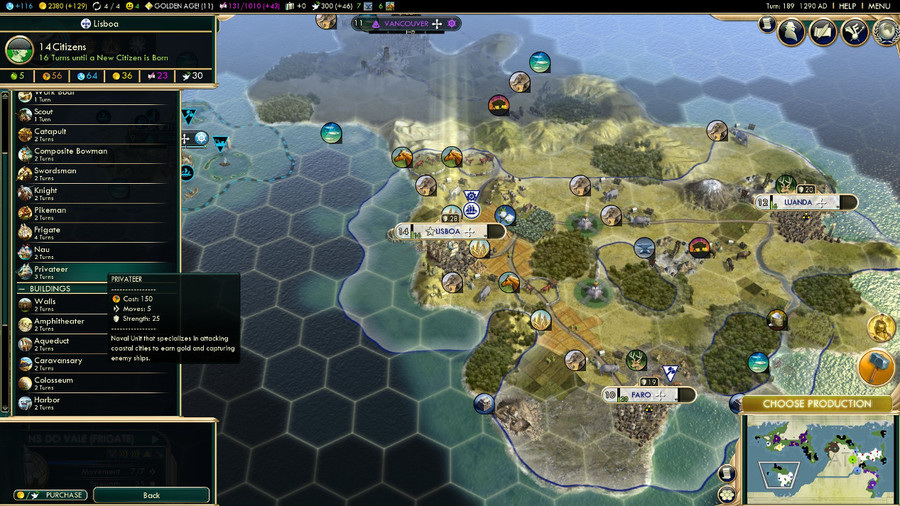
Lisboa, however, began to create plans for a new breed of warship, tasked specifically with taking the coastal city of Kabul from Roman hands.
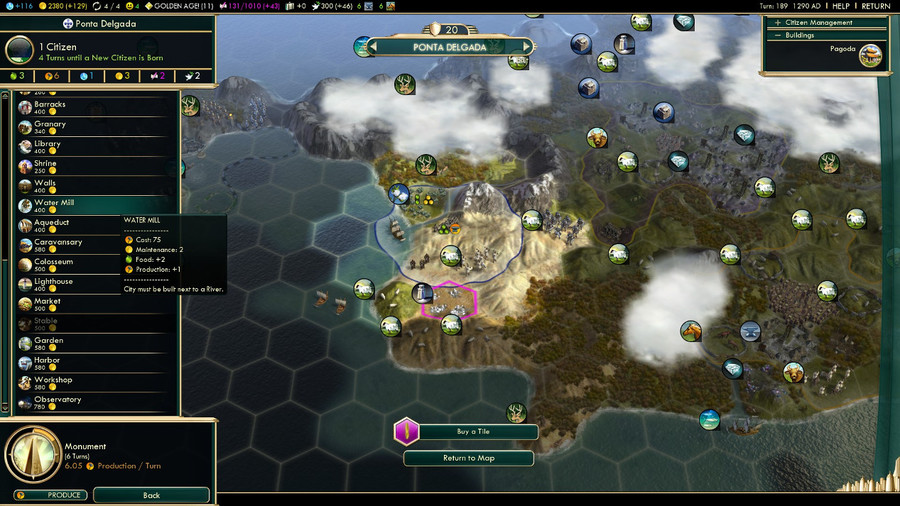
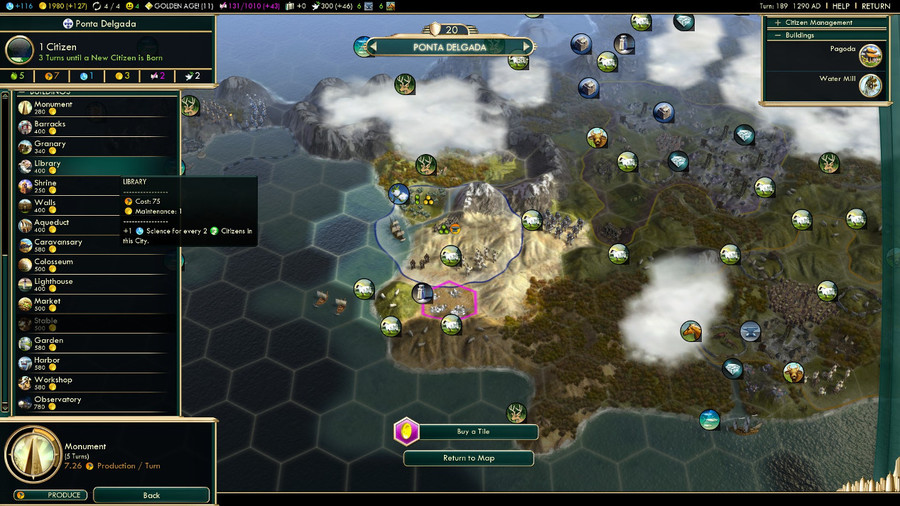
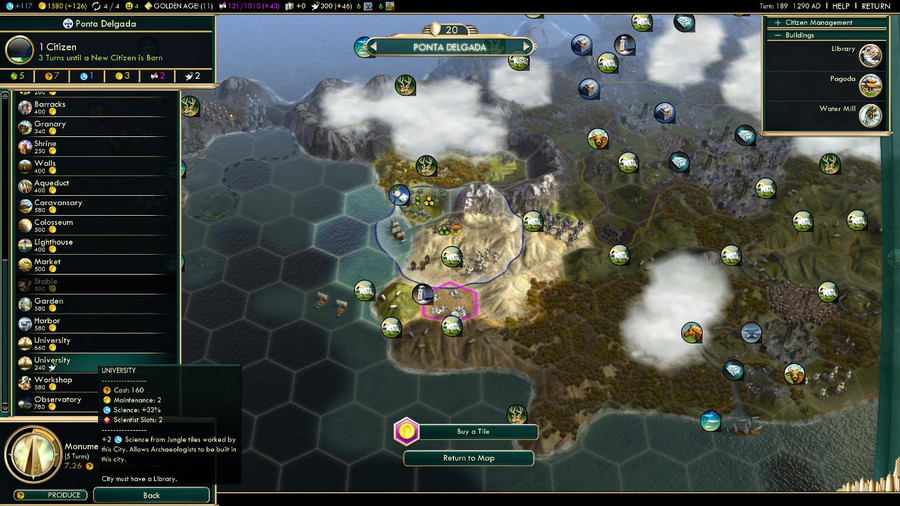
Dona Maria also opted to leverage the wealth of the nation into supporting the fledgling city of Ponta Delgada, paying for numerous improvements out of the royal treasury.
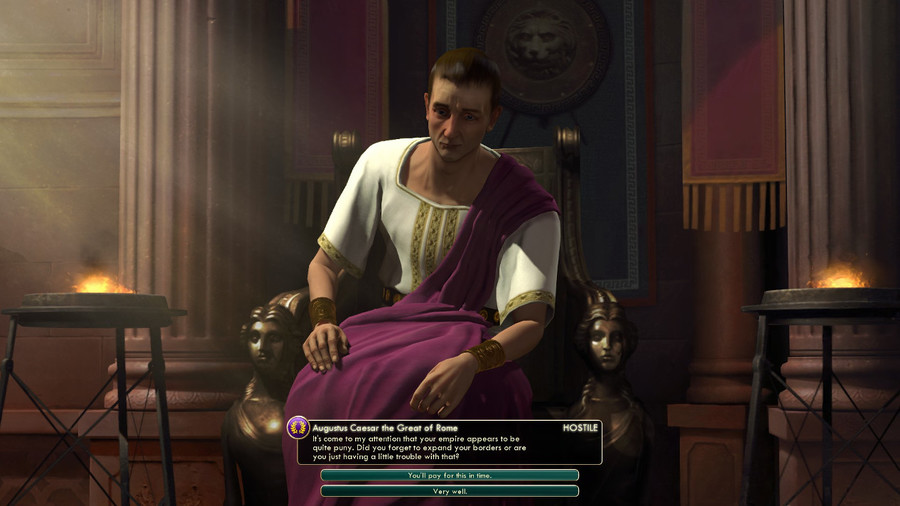
These efforts did little to impress the Roman, who instead seemed to amuse himself with delivering petty insults to the Portuguese monarch.
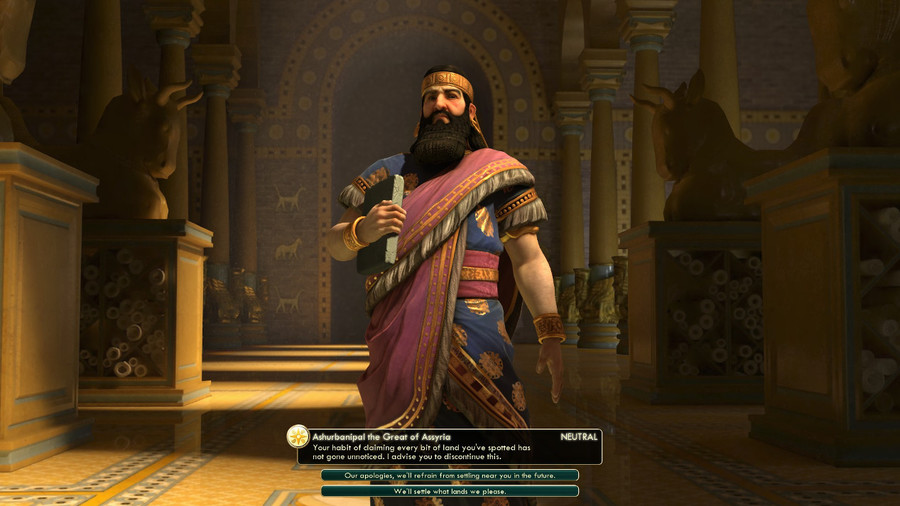
More surprising was Ashurbanipal's reaction, as though he did not know that the city was being placed there to support him. Dona Maria, desiring reconciliation, opted to agree to his terms, and no future Portuguese cities would be placed so close to his borders.
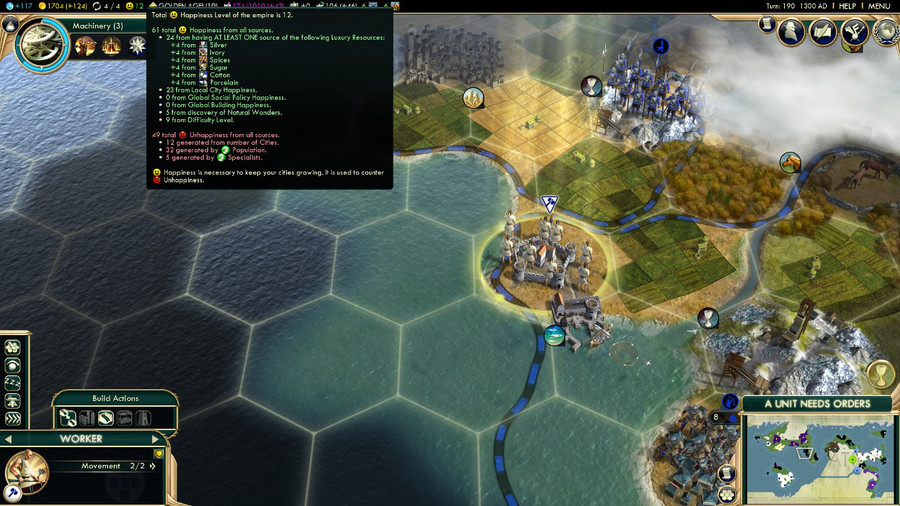
In Samarkand, the Feitoria was completed, and members of the Casa de Luanda soon had access to Silver and Porcelain goods that were spread throughout the nation. The Portuguese took to the practice of drinking tea, and the mood around the nation lightened significantly.
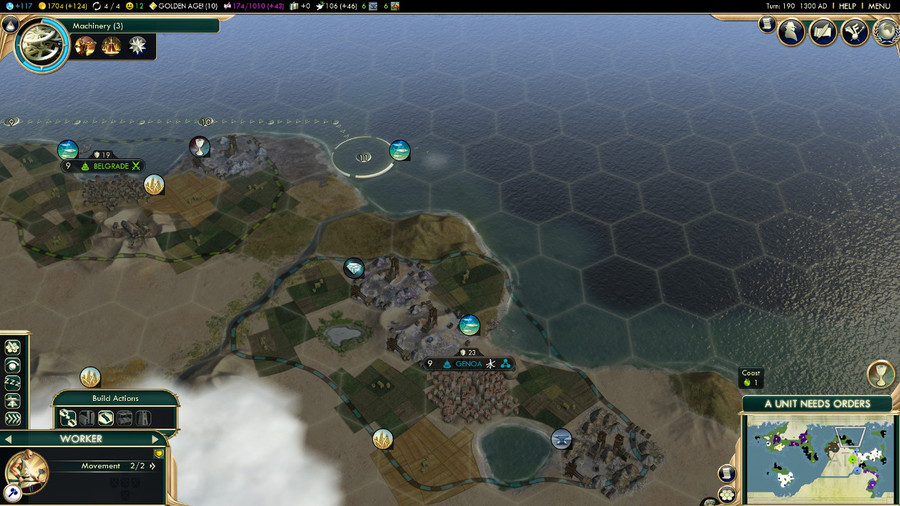
The Workers, however, would be taking a much longer trip to the distant shores of Genoa, in hopes of further gain.
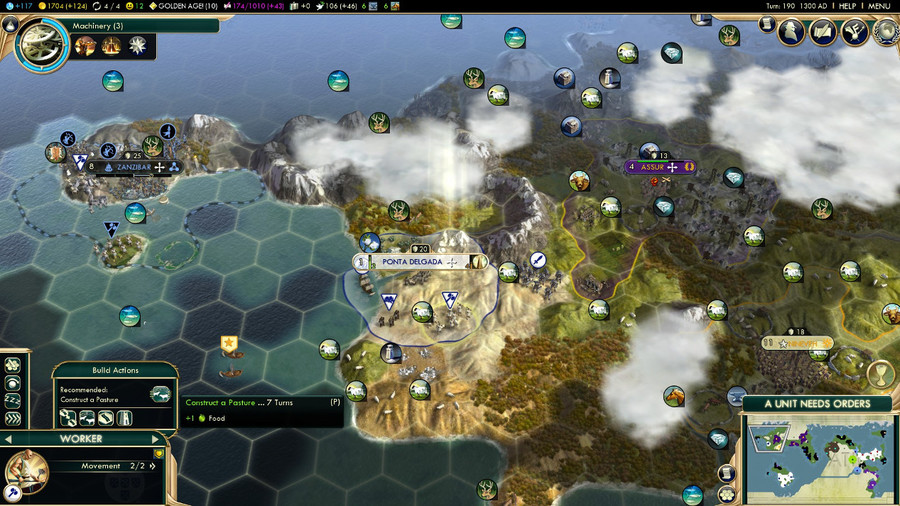
In Ponta Delgada, the Workers found the sheep to be a poor source of labour like horses, but they could be bred for warm woolen goods and serve as an excellent food source instead.
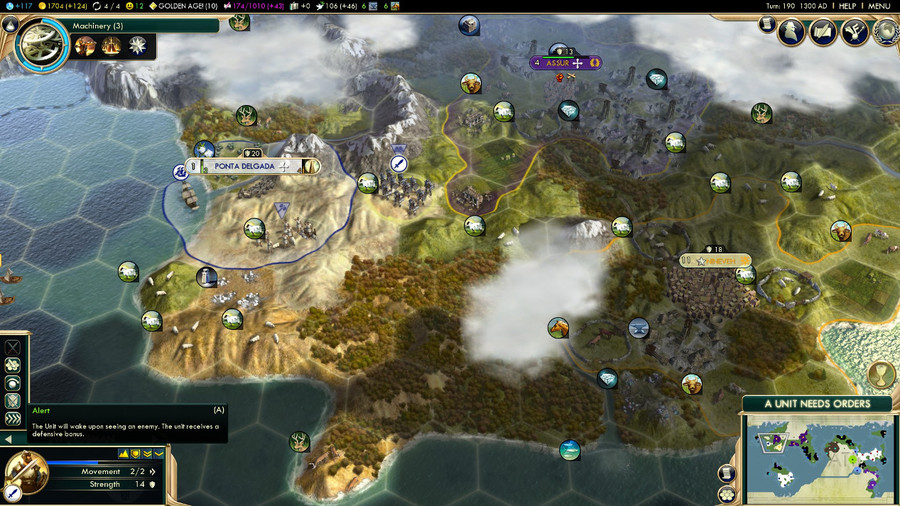
The Swordsman corps of Lisboa, unable to determine the progress of the Roman army, were ordered to stand by and await further instruction.
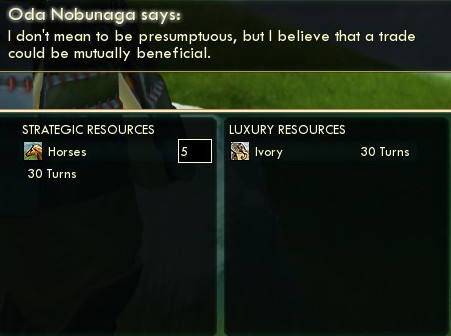
The warmonger Nobunaga offered another insulting deal, and was rebuked.
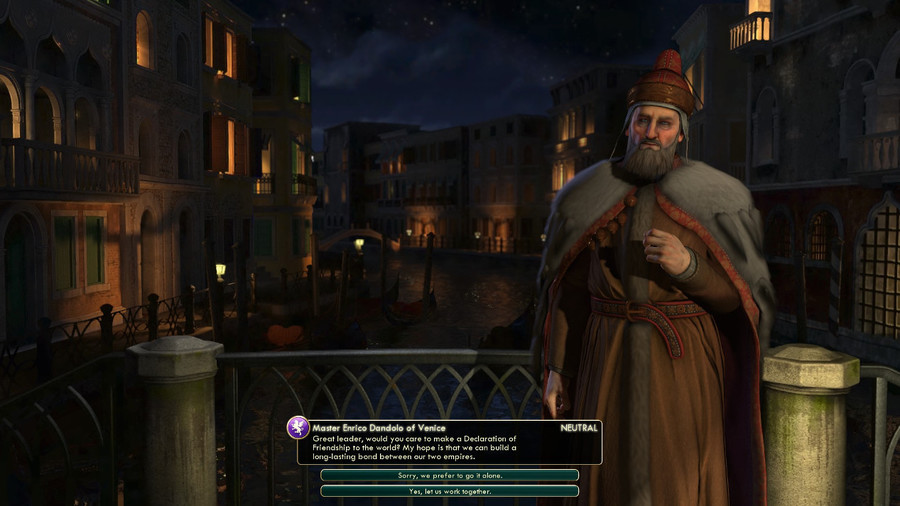
Dandolo offered a token gesture of friendship to the Queen, who simply stared at him in seeming disbelief for a moment before refusing.
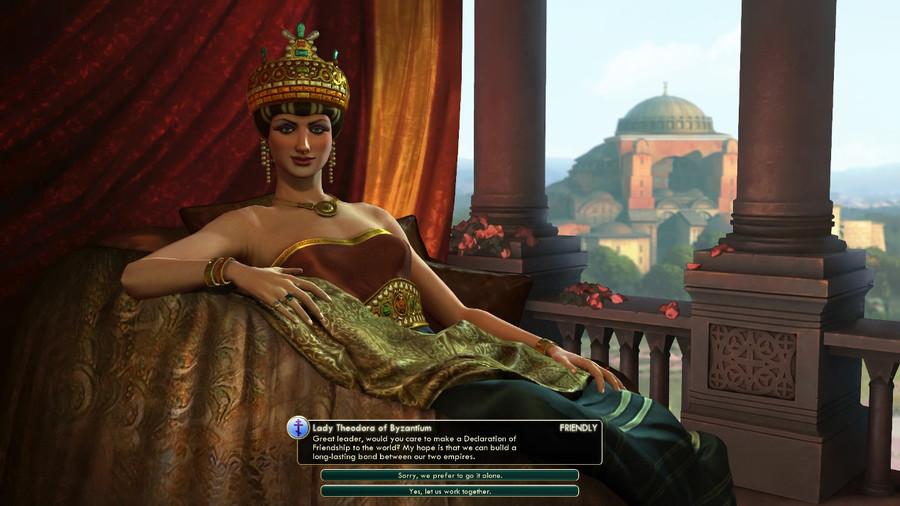
Theodora, however, seemed more worthy of Dona Maria's consideration, since their cooperation could hopefully bear more fruit when the time came to liberate Constantinople.
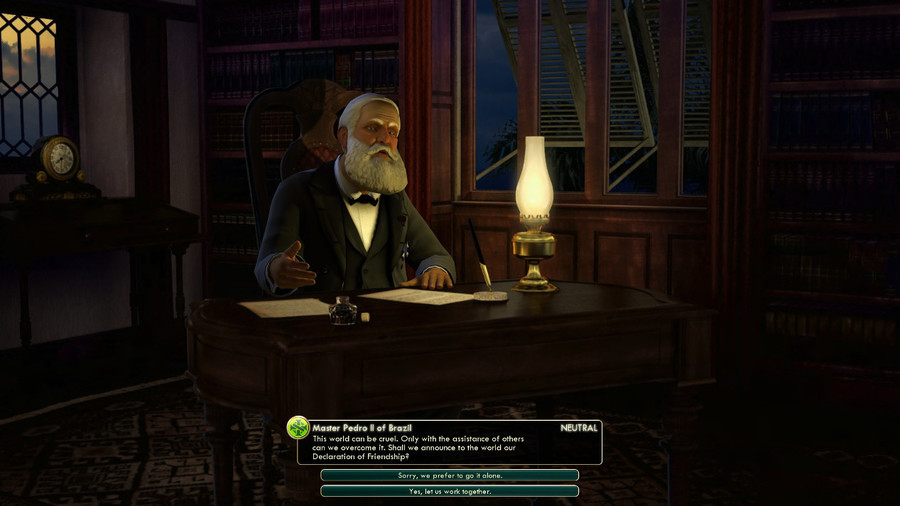
Dom Pedro seemed emboldened by these results, and asked Dona Maria and Theodora to form a tripartite bond of friendship, that the rest of the world leaders might understand that they stand together in the face of adversity.
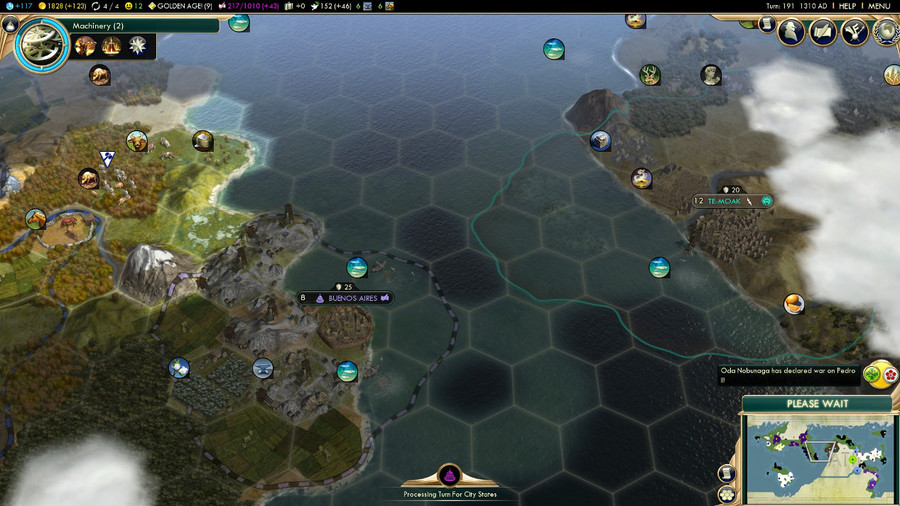
Unfortunately, the Japanese warmonger saw this as a challenge.
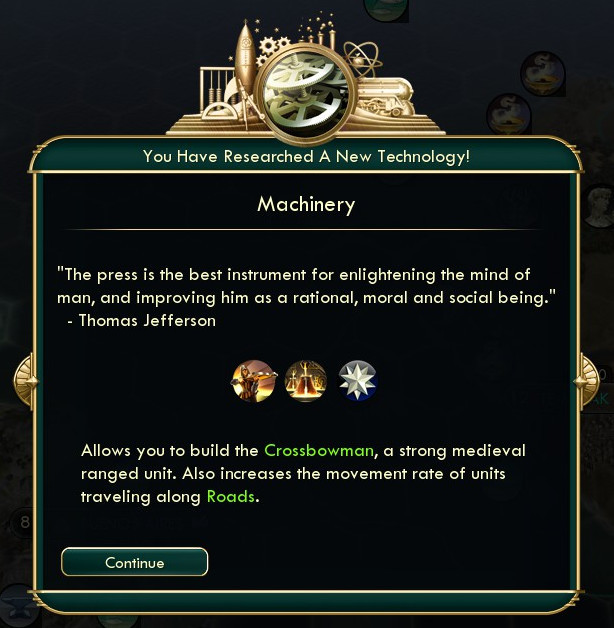
Portugal, however, was beginning to relish the thought of a challenge.

The terrifying warship, known as the "Man o' war", was deployed from the quay in Lisboa, prepared to wreak havoc on the high seas.
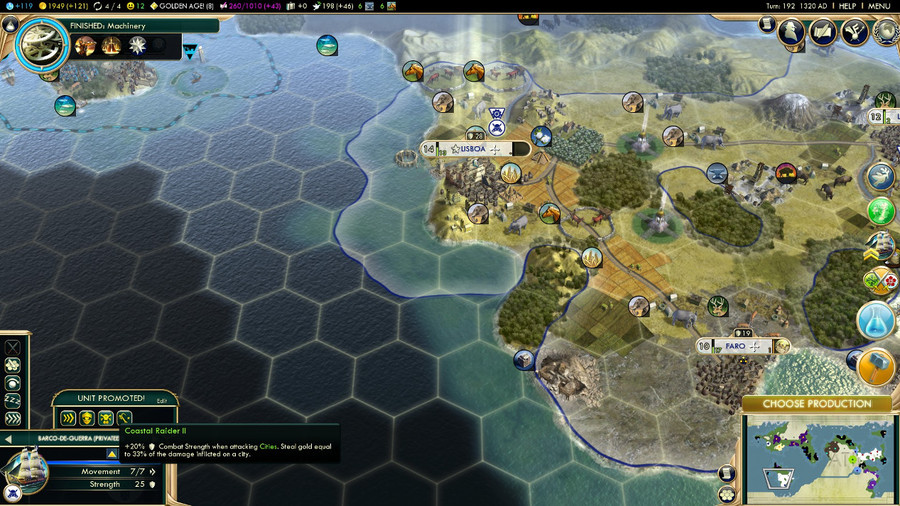
It was particularly suited for the task of conquering coastal cities, and would likely be the strongest symbol of Portuguese sea dominance against the Romans.
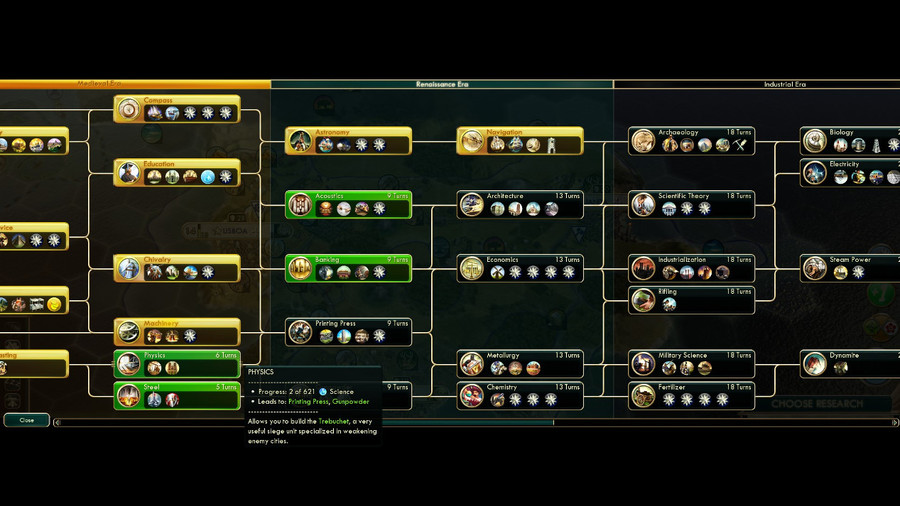
The subsequent effort to better understand the movement of its cannon projectiles through space seemed trivial in comparison.
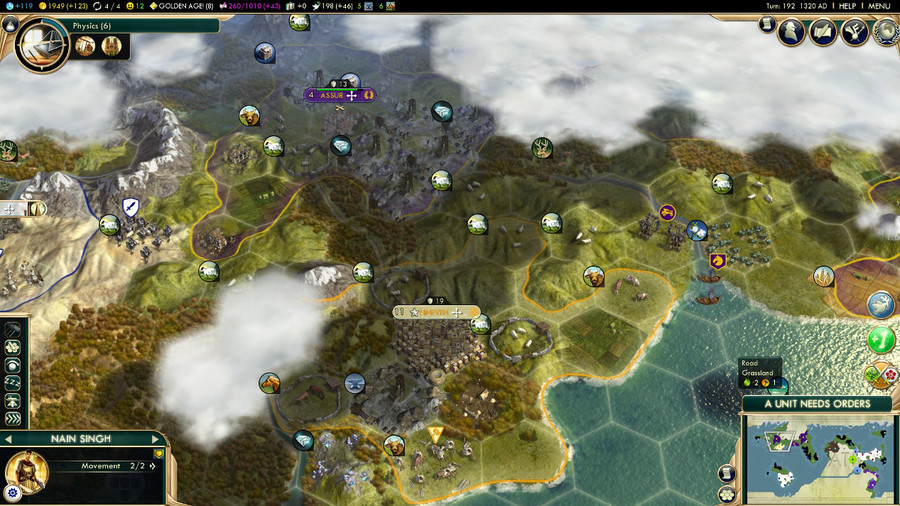
The Romans began moving towards the last of Ashurbanipal's cities.
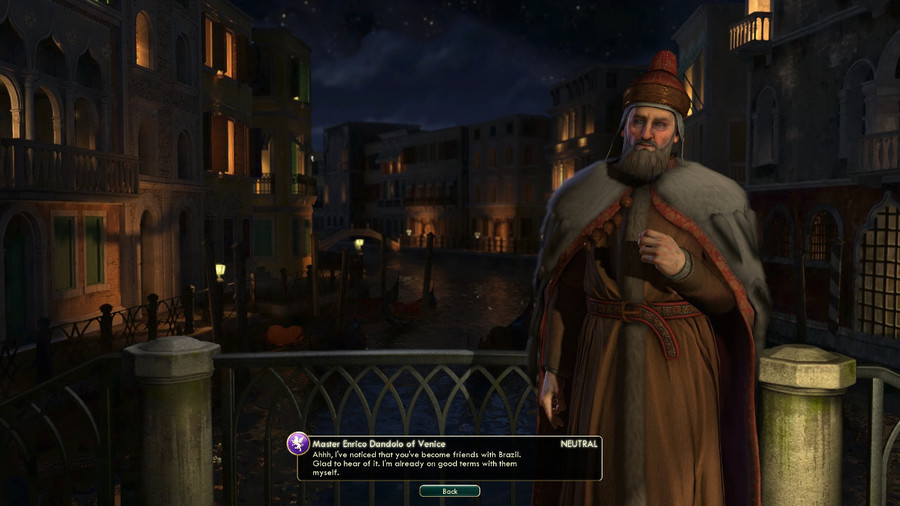
Enrico, meanwhile, revealed that he was also counted among Pedro's friends, which was a surprising sentiment given the marked theological differences between them.
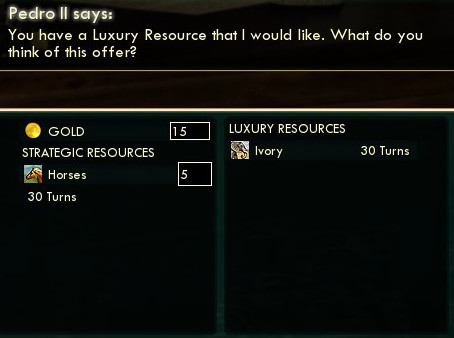
Pedro still had a poor grasp of the value of goods, but given his dire circumstances, Dona Maria decided to accept his offer without any changes in order to support him in his time of need.
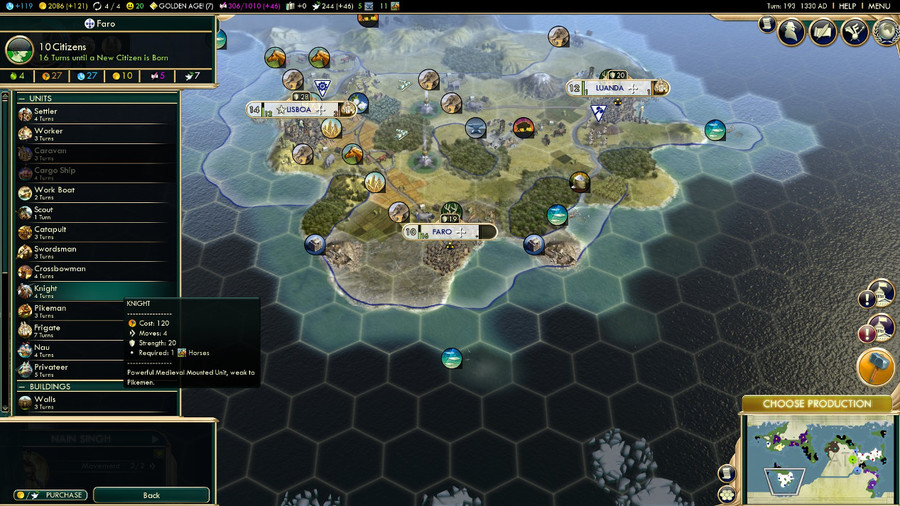
Lisboa and Faro began to develop squads of men, armored and mounted on horseback, to support potential amphibious action against the Romans.
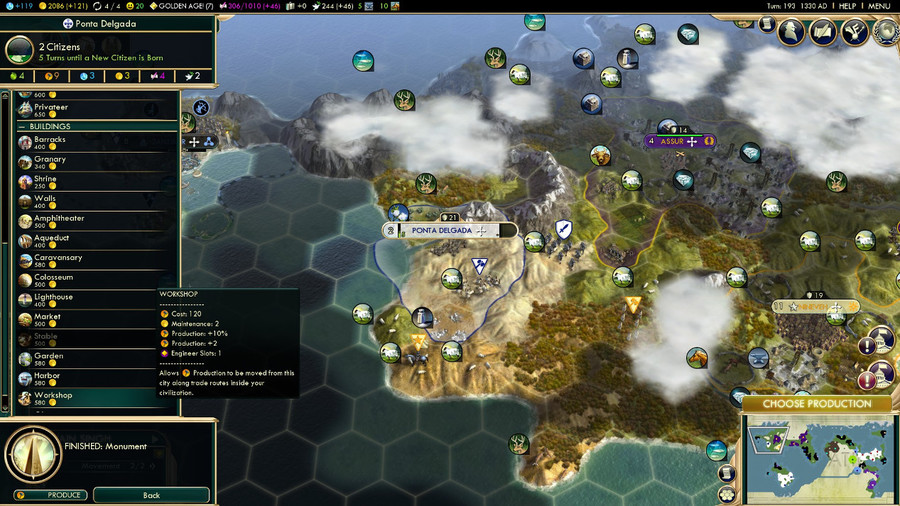
Ponta Delgada continued to enjoy support from the royal coffers.
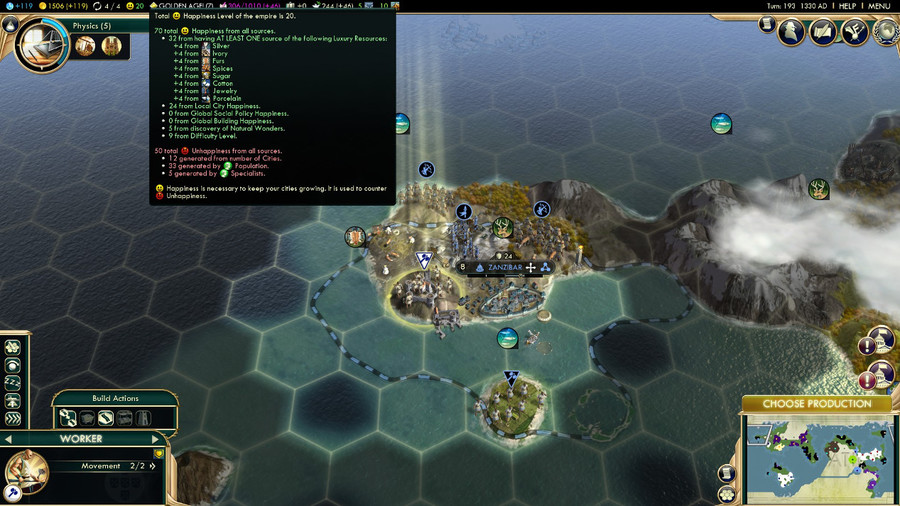
The Casa extended its reach to Zanzibar and its stores of fur goods and jewelry.
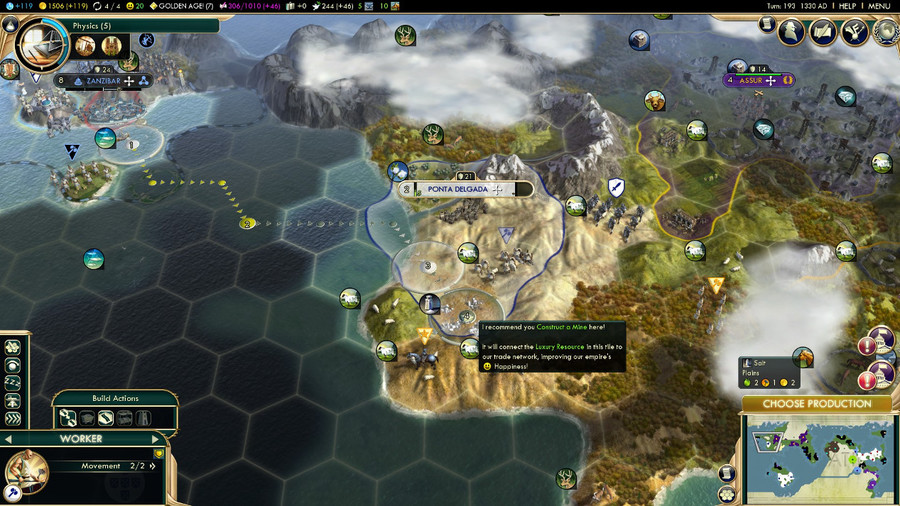
The Workers of Lisboa thus decided to move their efforts to Ponta Delgada.
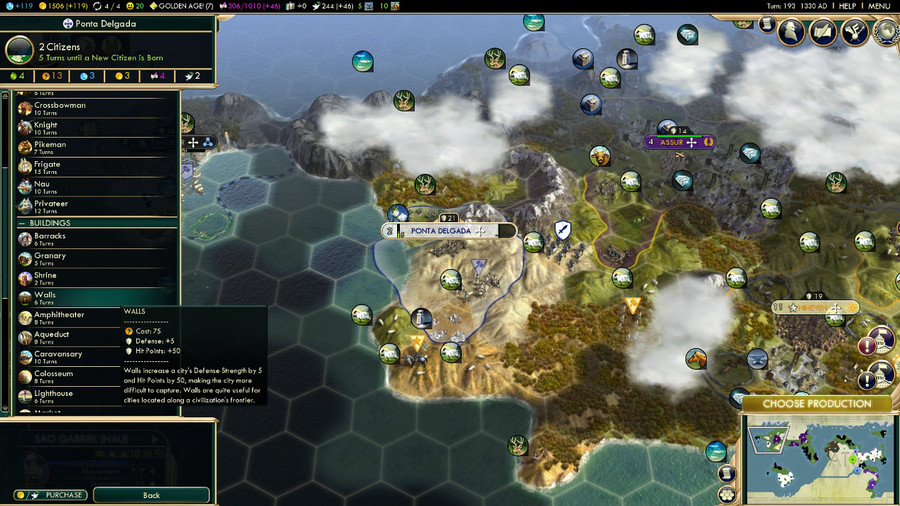
The city decided to preemptively develop defences against a possible Roman assault, and started building a perimeter wall.
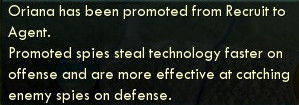
Other Portuguese defences showed themselves to be quite effective.

Unfortunately, their efforts were being employed against misguided allies.
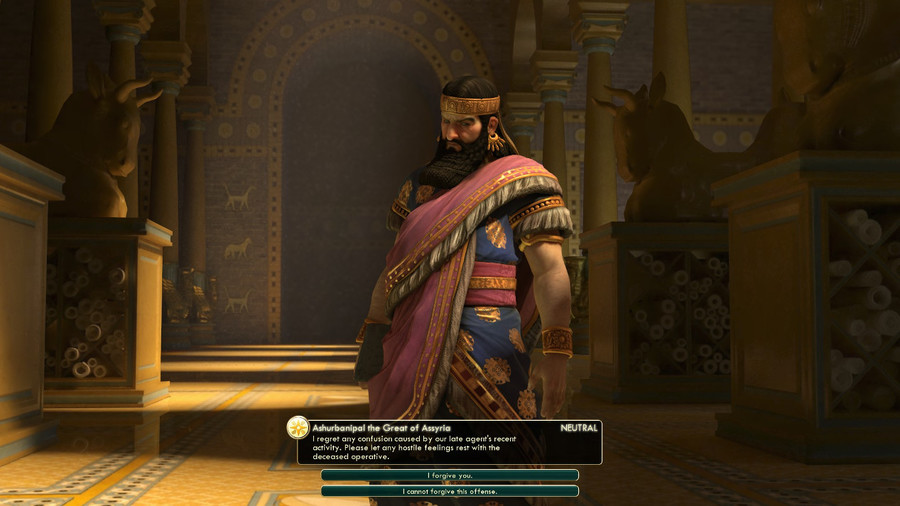
A chastened Ashurbanipal asked for forgiveness from his only ally, and forgiveness was offered to him.
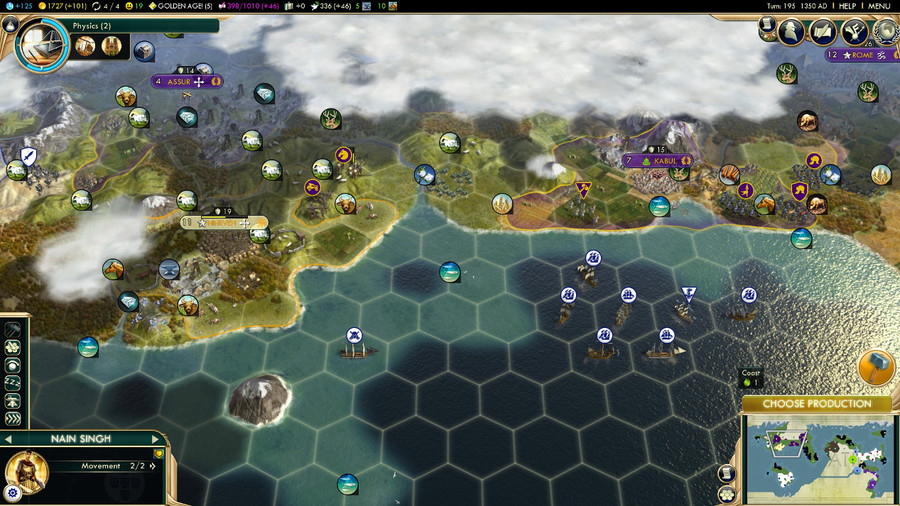
However, it was apparent that Nineveh was soon going to be the next victim of Roman aggression, and Dona Maria began to take uncertain steps forwards.
Both Dom João and Senhor Salazar informed their Queen that the time was right, as the Portuguese navy was very nearly in position to strike, and the people of Nineveh could not await any further delays in action.
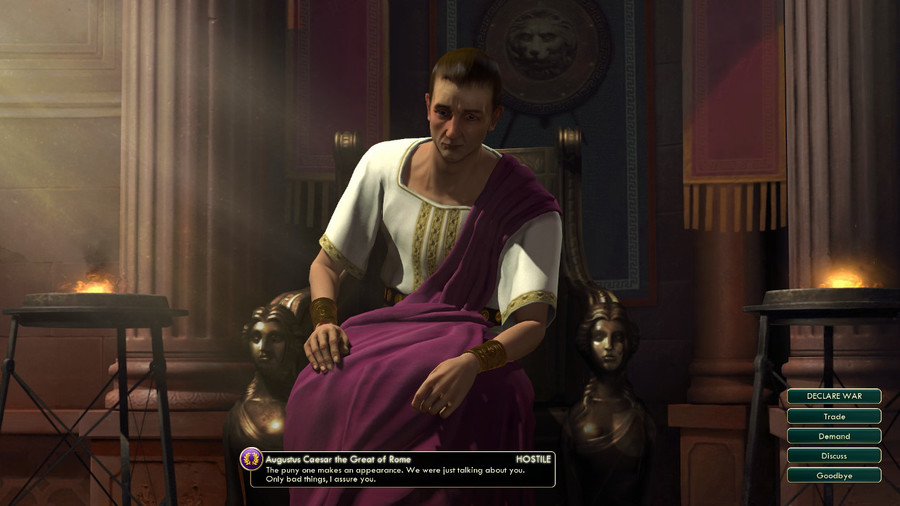
However, one more look at the grotesque grin on the Roman's face was all it took to convince Dona Maria.
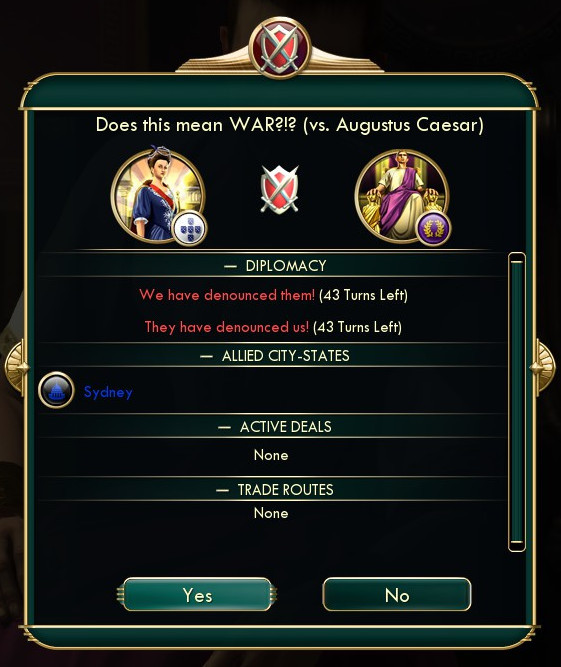
It is time for war.
A ser continuado....